Please donate £1 to support your parish
See below for details


3






Please donate £1 to support your parish
See below for details


3





"A joyful, courageous, generous, faith-filled teenager. A saint for our day and everyday. And a Londoner! A star!"
Blessed Carlo Acutis is among a group of people who going to be declared Saints. The Vatican announced the news recently, after Cardinal Marcello Semeraro, Prefect of the Dicastery for the Causes of Saints, met with Pope Francis, who approved the promulgation of several decrees related to the causes of canonisation of several men and women.
Carlo was born on 3 May, 1991, in London, England, and died on October 12, 2006, in Monza, Italy, of leukaemia at the age of 15.
Pope Francis beatified Carlo in 2020 in Assisi, where he had had made multiple pilgrimages and where he was buried.
The miracle recognised on Thursday is related to a woman from Costa Rica.
On 8 July 2022, Liliana prayed at Blessed Carlo's tomb in Assisi, leaving a letter describing her plea. Six days earlier, on 2 July, her daughter Valeria had fallen from her bicycle in Florence, where she was attending university.
She had suffered severe head trauma, and required craniotomy surgery and the removal of the right occipital bone to reduce pressure on her brain, with what her doctors said was a very low chance of survival.
Liliana's secretary began praying immediately to Blessed Carlo Acutis, and on July 8, Liliana made her pilgrimage to his tomb in Assisi.
That same day, the hospital informed her that Valeria had begun to breath spontaneously.

The next day, she began to move and partially regain her speech.
On 18 July, a CAT scan showed that all bleeding had disappeared, and on August 11 Valeria was moved to rehabilitation therapy. She made quick progress, and on September 2 Valeria and Liliana made another pilgrimage to Assisi to thank Blessed Carlo for his intercession.
Cardinal Vincent Nichols commented: "This is the fast-track to sainthood! Carlo Acutis, born in London, baptised in the Church of Our Lady of Dolours, Fulham Road, died at the age of 15 in 2006, computer savvy and sometimes bullied at school, he is now held before the world as an inspiration for all.
"Why?
"He understood the purpose of life. He said that he was not afraid to die because he had not wasted a minute of his life on things that didn't please God. He had a pathway to follow. He said "The Eucharist is the highway to heaven". He lived each day cheerfully, 'always united with Jesus'.
"A joyful, courageous, generous, faith-filled teenager. A saint for our day and everyday. And a Londoner! A star!"
In the decree, Pope Francis announced he will convene a Consistory of Cardinals to deliberate the canonization of Blessed Carlo Acutis, as well as Blessed Giuseppe Allamano, MarieLéonie Paradis, and Elena Guerra.
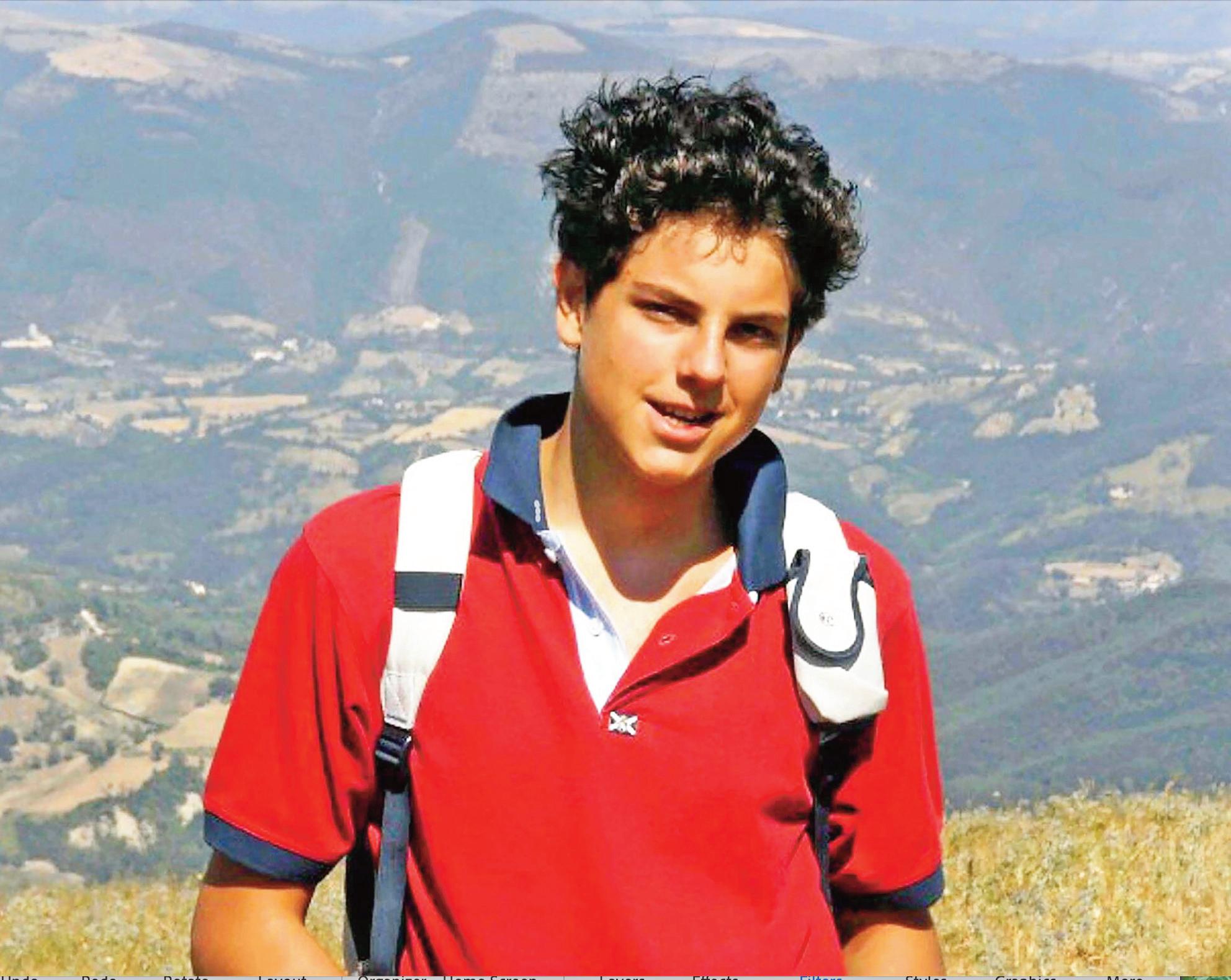
The decrees also recognised a miracle attributed to Blessed Giuseppe Allamano (18511926), an Italian-born priest who founded the Consolata Missionaries.
The miracle regarded the healing of an indigenous man in Cape Verde named Sorino Yanomami, who was attacked by a jaguar on February 7, 1996, in the Amazonian forest.
Even though his brain was left partially exposed, Sorino survived the ordeal thanks to surgery in Boa Vista and the intercession of Blessed Allamano after several members of his congregation prayed a novena for Sorino.
Pope Francis also recognized a miracle attibuted to the intercession of Venerable Giovanni Merlini (1795-1873), an Italian-born priest of the Missionaries of the Most Precious Blood.
The Pope recognized the martyrdom of a Polish priest - Servant of God Stanislav Kostka
Streich (1902-1938)- and a Hungarian-born laywoman - Servant of God Mária Magdolna Bódi (1921-1945) - both of whom were killed in hatred of the faith by communists.
The decrees also recognized the heroic virtues of the Servants of God Guglielmo Gattiani (Italian Capuchin priest, 1914-1999), Ismaele Molinero Novillo (Spanish layman, 1917-1938), and Ismaele Molinero Novillo (Italian layman, 1911-1974).
The Pope also approved the "favourable votes of the Ordinary Session of the Cardinals and Bishops for the canonization of Blessed Emanuele Ruiz and 7 Companions, of the Order of Friars Minor, and Francesco, Abdel Mooti, and Raffaele Massabki, Lay Faithful, killed in hatred of the Faith in Damascus (Syria) between July 9 and 10, 1860."
For more information about Carlo Acutis, visit his website at carloacutis-en.org


CONTACT US:
The Catholic Post is published by its owners Bellcourt Ltd and is wholly independent of and separate from any previous newspaper. The Catholic Post is published on the last Sunday of the month previous to publication date.
EDITOR: Nick Layton
email: editor@catholicpost.co.uk
ADVERTISING: Charlotte / Bellcourt Ltd. 01440 730399 charlotter@cathcom.org
DESIGN & LAYOUT:
David Lodge, davidl@cathcom.org
PUBLISHED BY:
Bellcourt Ltd. N2 Blois Meadow Business Centre, Blois Road, Steeple Bumpstead, Haverhill, Suffolk CB9 7BN 01440 730399
ARTICLES TO:
The Catholic Post email: editor@catholicpost.co.uk or davidl@cathcom.org
Please send articles for publication by email, supplying any photos separate to the text We welcome contributions
Here are answers to some basic questions about writing for The Catholic Post How long should articles be?
Usually it seems to work out best if contributors simply say what they have to say and let us worry about finding a spot for it in the paper. What is the submission procedure?
Please send as a Word file attached to an e-mail. To submit articles for publication, send to editor@catholicpost.co.uk
Charts, graphs, and photos should be submitted as separate PDFs. Electronic photos should not be embedded or pasted into a Word document as this reduces their quality.
Photographs and Illustrations
Photographs and Illustrations should be supplied electronically as high resolution JPEG (*.JPG) files).
Photographs and illustrations should be sent in colour with a resolution of 300 dpi and a minimum size of 100 mm x 100 mm when printed (approx. 1200 pixels wide onscreen).
Computer print-outs are not acceptable. Screen captures are not ideal as they are usually not very high
Parental permission should be sought before submitting photographs of minors. Source information -
DW = Diocesan Website.
ICN = Independent Catholic News
Views expressed in The Catholic Post are not necessarily those of the editor Last date for copy is the LAST DAY of the month prior to publication.

If we sense any reluctance to take our decision-making to God, that in itself should serve as a warning to us: why would we be trying to avoid discovering God’s will?
I’m taking as the basis for this reflection Robert Frost’s poem “The Road Not Taken”. He never actually uses those words in the poem itself, but rather, in the final verse, “the road less travelled by”.
Two roads diverged in a yellow wood, And sorry I could not travel both And be one traveller, long I stood And looked down one as far as I could To where it bent in the undergrowth;
Then took the other, as just as fair, And having perhaps the better claim, Because it was grassy and wanted wear; Though as for that the passing there Had worn them really about the same,
And both that morning equally lay In leaves no step had trodden black. Oh, I kept the first for another day! Yet knowing how way leads on to way, I doubted if I should ever come back.
I shall be telling this with a sigh Somewhere ages and ages hence: Two roads diverged in a wood, and II took the one less travelled by, And that has made all the difference.
As Frost is walking through the woods the path he is on suddenly diverges and he has to make a decision as to which way to go. Apart from the fact that one of paths disappears round a bend so he can’t see what lies ahead, both are otherwise equally attractive, but he chooses to take the other path simply because it looks slightly less-used than the first – perhaps curiosity as to why fewer walkers appear to have gone that way gets the better of him. He also makes the conscious decision that, no matter what lies ahead, he will stick with the choice he has made. Is “the sigh” with which he says he will one day tell his story a sigh of contentment with the choice he made, or a sigh of regret at not knowing what he might have missed on the road he didn’t take?
St Ignatius was a great person for teaching the importance of discernment when we have significant choices to make. If we are as open to God’s will as we should be, then we need to be completely detached from the various options that are before us and allow ourselves to be guided by the Holy Spirit in the decision we make. Essential to this process is prayer –prayerfully seeking God’s will and ensuring that we are not just persuading ourselves that what we want to do is what God wants us to do. Ignatius had experienced the process of discernment while he was recuperating from surgery following a serious wound to his leg received in battle when he was a soldier. To pass the time he asked for something to read, hoping for books about romance and chivalry but none was available. Instead he was given books about the lives of Christ and the saints, at the time not quite his taste in reading matter. However, what he found was that when he day-dreamed about soldiery and chivalry the good feelings it gave him didn’t last very long, whereas the spiritual consolation he experienced after reading about Jesus and the saints had a more lasting effect and led him to speculate about a change of lifestyle that would enable him to imitate the deeds of the saints. This “discernment of spirits” will be a sign to us of how much we are at peace with the decisions we make and therefore of whether (or not) the choices we are in the process of making, or have made, are according to God’s will.
Returning to Frost’s situation in the poem, he comes to a divergence in the road he is on and, in the absence of an actual signpost to help him, he must make a choice as to which way to go. If, as he continues on his journey, he was to become increasingly convinced that he had made the wrong choice, it would obviously be rather foolish to keep on going in the hope that his situation will self-correct. The only thing to do, no matter how much time and energy has been wasted, would be to go back to the fork in the road where he made the
wrong choice and this time take the other road. But for now he goes with the choice he has made and, “way leading to way”, he doesn’t expect to have to retrace his steps.
The most important factor in that entire process is being open to the signs along the way that will tell us whether we are on the right road or not. On the one hand we may experience, just as St Ignatius did, feelings of consolation from God when our choices are according to his will, or on the other hand the opposite – disquiet, upset and a lack of peace – when they are not. Bringing our decisionmaking to God in prayer is going to be essential in discovering what his will is for us, and clearly it is better that we spend time doing that than spending it later putting things right. If we are as open to God’s will as we should be, then we need to be completely detached from the various options that are before us and allow ourselves to be guided by the Holy Spirit in the choice we eventually make. If we sense any reluctance to take our decision-making to God, that in itself should serve as a warning to us: why would we be trying to avoid discovering God’s will?
At the end of the poem Frost says: “I took the (road) less travelled by, and that has made all the difference”. It’s all too easy for us to simply follow the crowd, or be pressured into doing so, and it can take considerable conviction on our part to choose instead what we know to be the right thing to do. It’s at times like that that we experience the “price” of being a follower of Christ - of not joining in whatever everyone else is doing when we know it’s wrong and instead of standing our ground (actually God’s ground) and bearing witness to what we know to be right. At such times we need to ask God for the very particular grace that we need in order to make the right choice and to do his will – a process the Church calls “informing our conscience”. There will always be a sign if we take the time and trouble to look for it. Of course it might have fallen over and be lying in the long grass, but we are only fooling ourselves if we pass by looking the other way. When we eventually have to turn back because we took the wrong road, we might wish we had been more observant – especially of God’s will.
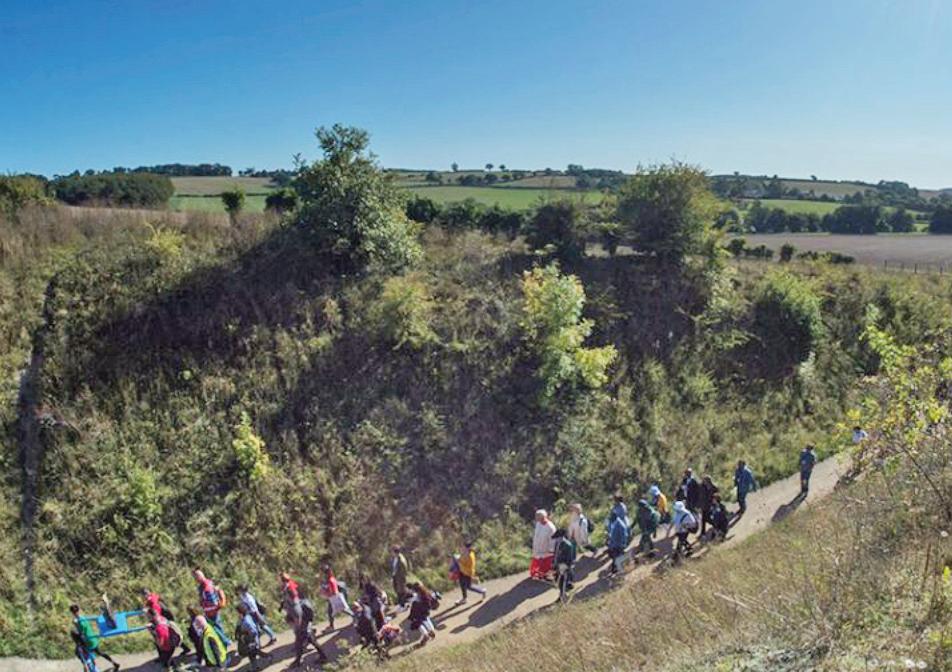
portsmouthdiocese.org.uk
The idea was inspired by Pope Francis’ words about pilgrims, when he said: “Whoever they may be… in every person there is a heart in search of God”.
Walking outdoors has proven long-term improvements for emotional and mental health, as well as bringing about a reduced risk of depression and higher levels of happiness and self-esteem.
Coinciding with National Mental Health Awareness Week’s 2024 theme of ‘Moving More for Mental Health’, a new collection of Catholic walking pilgrimages has been launched online, encouraging people of all faiths and none to explore some of the holiest sites in England and Wales.
‘Hearts in Search of God’ is a three-year project mapping out 22 pilgrimages, with each route starting at one of the 22 Catholic Cathedrals in England and Wales, before going on to at least one of the local Shrines, with the shortest route being 10 miles.
A website listing the new routes has been launched and can be found at pilgrimways.org.uk, providing walking guides, GPX files, prayers and other resources, including a downloadable ‘Pilgrim Passport’, and a certificate at the end of your walk.
The project has been organised by retired GP Dr Phil McCarthy, former CEO of Caritas Social Action Network (CSAN), who has so far walked seven of the Ways and intends to finish the rest in the next two years.
He said: “I hope the Ways might be useful to Catholic charities for fundraising walks, but you don’t have to be formally religious or be walking as a part of a big group to follow these Ways. Walking allows us all to pay attention, to notice small things and to enjoy ordinary places.
I hope the new Pilgrim Ways will be an opportunity for Christians to deepen their faith, but also for people of all faiths and none to experience a pilgrimage in a Catholic context and with the minimum of financial and environmental cost.”
The idea was inspired by Pope Francis’ words about pilgrims, when he said: “Whoever they may be…in every person there is a heart in search of God”.
Dr McCarthy added: “To go on pilgrimage is to participate in a practice which is ancient and universal. Walking pilgrimages are slow, humble journeys in constant contact with the Earth. They encourage awe at the magnificence of creation.”
Dr McCarthy is scheduled to embark on the Portsmouth Diocese Pilgrimage (St Johns Cathedral to the Shrine of St Joseph in Farnborough) in the Summer.
The pilgrimages which provided the models and inspiration for this project are:
St Wilfrid’s Way
Diocese of Leeds: Leeds Cathedral to Ripon, via Our Lady of the Crag, Knaresborough.
St Mary’s Way
Diocese of Lancaster: Lancaster Cathedral to St Mary’s Church & Grotto, Cleator.
Augustine Camino
Diocese of Southwark.
In Arundel & Brighton Diocese there is a longer, two-week annual ecumenical walking pilgrimage Pilgrims Live!
Nationally, there is Pilgrim Cross, formerly Student Cross, a series of routes that lead to Walsingham during Holy Week.
Many priests in our dioceses will have been allocated to new parish positions as from September. These moves tend to cause upset and anxiety in parishes, and often fear of change and of the unknown. This, however, may not just affect parishioners, but the priests also!
Priests may be thoroughly unsettled at the thought of leaving the parish that they have grown to know of as home, the people they know, and of the prospect of being moved into what may be a completely different and new environment from what they are used to.
Whoever they are and wherever they are placed, priests need our quiet prayers and support both in the leaving of their present parish and in being welcomed into their new position. In this way, hopefully, their move can be made without too much anxiety.
Small actions of appreciation and positive support can make a very great difference in all situations. For instance, maybe a group effort could be made to ‘spring clean’ the presbytery before a new priest arrives, so that it is clean and fresh, with soap and towels laid out and the bed made up for him. Perhaps also with a newly baked loaf of bread left for him, or a home cooked meal ready to put in the oven.
In our care for our priests, it is worth pondering the following words of a Franciscan:
“A priest is not born of an angel but of a mother.
He is chosen from amongst the people; is anointed with the Sacrament of Priesthood and returned back to the people, to the Church – into their care, their prayer and their love.
The priest is a sign of the omnipotence of our God. Pray for priests. Love them. Support them.” www.crownofthorns.org.uk email: office@crownofthorns.org.uk
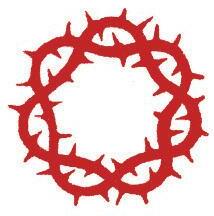
Promoting the Holy Rosary in the U.K. & throughout the world to bring hope, comfort and peace to the marginalised, the oppressed and the imprisoned, enabling wounded hearts to find healing and shattered lives to find breath and space to renew.
Supporting priests and chaplains in their ministry, outreach and welfare.
“I am the Lady of the Rosary. Continue always to pray the Rosary every day.”
(Our Lady at Fatima)
www.crownofthorns.org.uk
email: office@crownofthorns.org.uk
Phone: 01342 870472
Registered charity no: 1042751
On 1st August 2023, the Bethlehem Care and Hospice Trust, a UK based Charity quietly launched a new and ground-breaking service in Bethlehem. It is the first licensed palliative care service in the Occupied Palestinian Territory (OPT).
The Bethlehem Care and Hospice Trust is a registered charity in the UK and in Ireland. It is a registered NGO in Palestine. It was set up in response to requests from local community leaders who highlighted the limited provision of care for the terminally ill in Palestine.
Cancer is the second major cause of death in the OPT. Seven out of every ten cancer cases are at terminal stage when first diagnosed. A recent report identified Bethlehem as having the highest concentration of cancer cases in OPT.
Prior to the launch of the service care for the terminally ill was generally unsupported.
Described as ‘a major humanitarian service and the first of its kind to be licensed by the Palestinian Minister of Health’: the "Bethlehem Care and Hospice Trust" has to date provided palliative care to 94 patients and has made over 850 home visits supporting patients and their families. This includes providing equipment the patient would need that is not normally available in the home, such as oxygen machines, anti-decubitus mattresses, and wheelchairs. Pain relief is very important for these patients, but this hospice care extends beyond pain control and the supply of equipment and it includes support to grieving families.
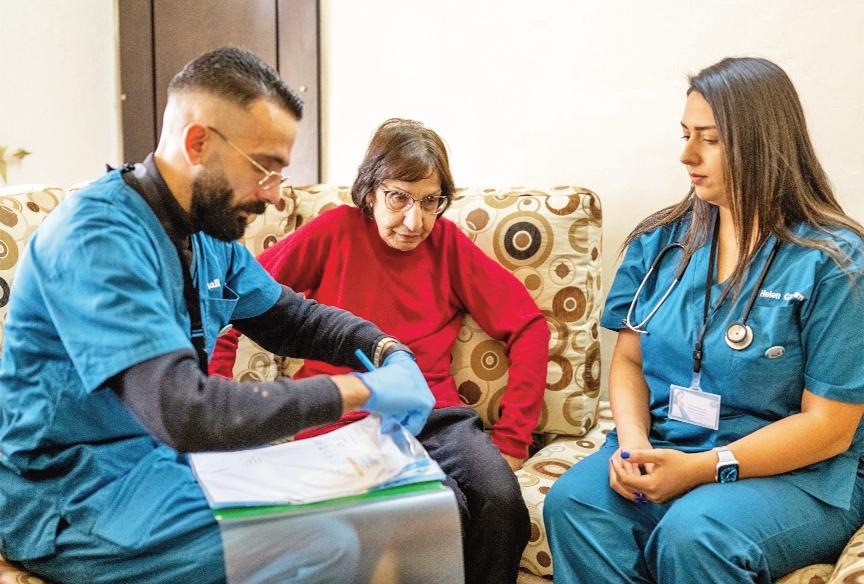
There are a great many people in the OPT with no care available to them. Communities are reaching out to the Trust for help and support and while it has ambitions to care for many more terminally ill patients and to extend its services to other communities, sadly it does not have the resources to provide such care, or to extend services beyond the Bethlehem Governate. Neither the local communities in the OPT or the Palestinian Authority have the resources to support Hospice Care.
The present situation
Bethlehem today sees no active conflict, yet the lingering repercussions of war weigh heavily on its residents.
The tragic events of Saturday 7th October, and subsequent incidents have effectively para-

lyzed the local economy in communities like Bethlehem. Security checkpoints continue to isolate these areas, impeding the free flow of goods and people.
Bethlehem's economy heavily depends on tourism and pilgrimages, yet during times of turmoil tourists and pilgrims do not come causing widespread hardship. Presently hotels stand vacant, bus and coach operators, tour guides, cafés, restaurants, and tourist sites have all shuttered their doors, resulting in employee layoffs and wide unemployment.
A World Health Organization report dated September 16, 2023, highlighted that 40% of the Palestinian population survives on less than $2 per day (£1.58p). The people simply do not have the means to support themselves.
Regrettably, in a region already grappling with limited employment opportunities and modest living standards, these individuals may remain jobless until lockdowns are lifted and the economy rebounds.
In these circumstances the young and healthy emigrate in search of work, security and a better life leaving the sick and the elderly. They cannot leave. They must endure. This inevitably increases the demands on the limited resources of our hospice service.
However, even amidst movement and travel constraints, these dedicated Hospice Nurses persist in their compassionate work, providing care and comfort to individuals with life limiting illnesses in the Bethlehem region, in the sanctity of their homes, despite the tumultuous circumstances that envelop them. Daily these nurses courageously confront concerns for their personal safety, yet their commitment remains unwavering as they go out and attend to the most critically ill.
This service is presently the only licensed hospice service in the OPT providing essential palliative care to terminally ill patients, enhancing their quality of life and supporting their families.
Fr Rami Asakrieh, Parish Priest of St Catherine’s Bethlehem and Chair of the Charity’s Bethlehem Board says, ‘People are very happy that care is being given to the very sick and their families are being helped and supported. This service is a great blessing to the people of Bethlehem.
Joe McNally, Trustee of the Charity says, ‘The Charity’s ambition is to develop and extend the service beyond Bethlehem into other towns and villages in the OPT so as to extend a compassionate caring hand to those who are suffering so as to enhance their quality of life on a daily basis.
We are seeking support in this really important work, because under constant difficulties and deprivations these communities do not have the resources to provide for their terminally ill and elderly themselves.
Every contribution makes a real difference in enabling some of the world’s most vulnerable people, who have spent much of their lives under the shadow of injustice, violence, and warfare to spend their final days being cared for, pain free and with some dignity.
Funds and volunteers are urgently needed, and we ask those who share our compassion to join us in making this vision a practical reality’.
To find out more or to offer your help e-mail info@bcandht.org or visit www.bethlehemcareandhospicetrust.org
“I very much look forward to meeting and supporting our many communities across the city during my year of office.”
Councillor Robert Rigby was elected the new Right Worshipful Lord Mayor of Westminster following a vote on 15th May.
A practising Catholic, the Lord Mayor was educated at Ampleforth as were his two two brothers, late father and uncle, and a cousin went on to become a Benedictine monk.
The Lord Mayor said: “My education at Ampleforth instilled within me the need to put others first and recognise the two pillars of the rule of St Benedict’s teaching namely ‘listen’ and ‘humility’. Catholic values and social teaching have been and remain important, and that was particularly clear to me during my time as chair of the Catholic Union.
“Catholicism plays a big part in my life, and I try every day to lead a life which reflects those values. I see it as a strength and feel it will be invaluable in my year of office where I will be attending more than 500 engagements and meeting thousands of people from many different backgrounds.”
The Lord Mayor’s chaplain will be Father Christopher Colven, past Rector of St James’s Church, Spanish Place, in Marylebone. Fr Colven is currently the Catholic Chaplain to the Houses of Parliament.
As a Westminster City Councillor, Cllr Rigby has represented Regent’s Park ward on Westminster City since 2010. His career at Westminster City Council has taken in senior roles including chair of the planning committee; deputy cabinet member for finance and regeneration; deputy cabinet member for parking and housing and chair of the Lord’s community group.
The new Lord Mayor said: “It is a huge honour and an enormous privilege to accept this role. Westminster is truly an international and multicultural city, and our diverse and vibrant communities make it special and different from other London local authorities. I very much look forward to meeting and supporting our many communities across the city during my year of office.”
The Lord Mayor has chosen two charities to champion: the Cardinal Hume Centre, which looks after homeless young people and the MCC Foundation, which promotes cricket to different communities across the country through free training and matches.
Cllr Rigby said: “I have long been impressed with the work the Cardinal Hume Centre does in providing a lifeline to young people and families. There are complex reasons why people become homeless, and the Cardinal Hume Centre is fantastic at helping young people who, for whatever reasons, have ended up on the streets.”
It was while a teenager at Ampleforth College in 1976 that Cllr Rigby heard the great bell at the Abbey Church ring out to mark the appointment of the-then Abbot Basil Hume as Archbishop of Westminster.
The Lord Mayor’s other charity will be the MCC Foundation. He added: “One of my key themes for the Mayoral year will be getting our young people fit and engaged with sport. I can think of no better partner than the Marylebone Cricket Club Foundation, which does an amazing job introducing children and teens to the game. Cricket is for everyone, and the MCC Foundation works in communities where young people might not perhaps have thought of trying it.”
The New Lord Mayor, aged 63, has lived in St John’s Wood for more than 35 years. He has spent his working life in sales and marketing within the travel industry, including 20 years with Japan Airlines during which time he met his wife Emiko.
A keen runner, The Lord Mayor is a trustee of the London Marathon Foundation but regularly runs 10k and cross-country races as a member of the Shaftesbury Barnet Harriers. Speaking at the Mayor Making event held at Marylebone Town Hall, Cllr Rigby said: “As Lord Mayor it will be a year of firsts – the first time Westminster has had a Japanese Lady Mayoress, and I’m pretty sure it will be the first time for a Lord Mayor to run a 10k race in under 40 minutes!
The Lord Mayor plans to get young Westminster residents up and running by visiting primary schools and promoting the Daily Mile – the initiative to encourage all young children to walk or run a mile every day – and he hopes to get as many youngsters as possible to enter the Westminster Mile event in September.

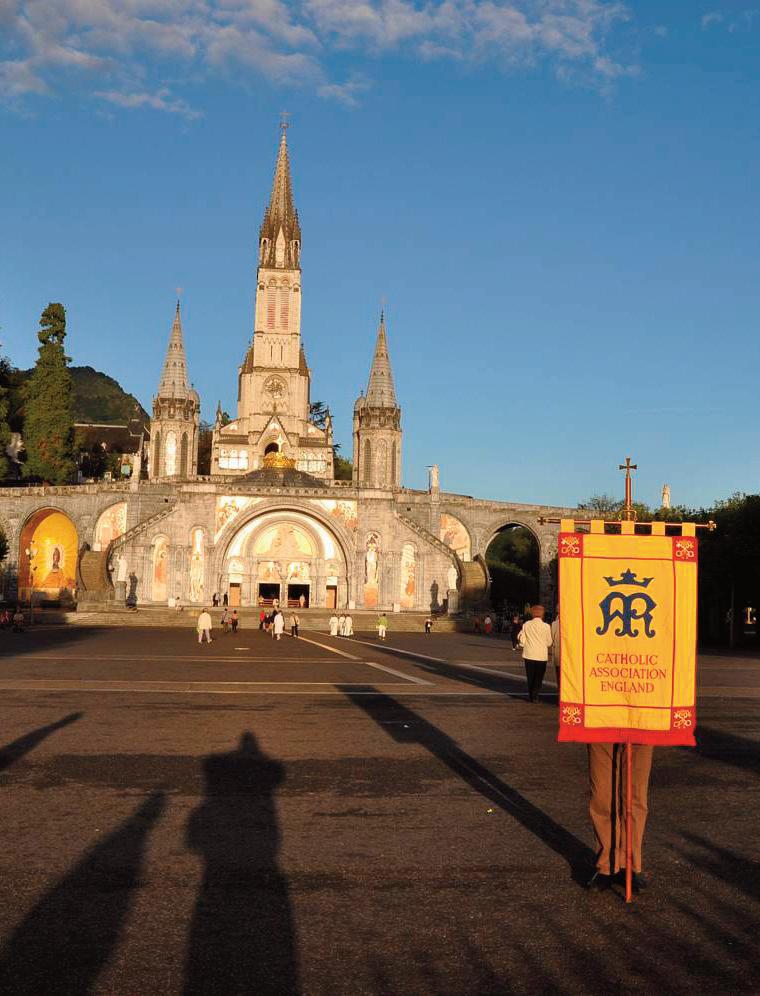
There are currently 17,000 children who are unaccompanied as they were separated from their parents and are most likely orphans
The recent visit of His Beatitude Cardinal Pizzaballa to Gaza may have taken the world by surprise, but for us working closely with him and knowing how passionate he is about the suffering of our people there, it was certainly overdue. Despite all the risks, the visit was an incredible show of solidarity giving hope to our community. For a few days, he lived the life of our brothers and sisters in Gaza where one has to manage to sleep on the sound of explosions with no electricity and rationed food supplies. What is taken for granted anywhere else in the world has become a luxury in Gaza.
Since the beginning of the war on Gaza, the level of human loss and destruction has been unprecedented in our Holy Land. The statistics issued by the United Nations Office for the Coordination of Humanitarian Affairs (OCHA)
are devastating including 35,500 Palestinians killed and 80,000 injured with 60% in both categories being elderly, women, and children; 1.7 million people (75% of the population) who are internally displaced with 60% of residential units damaged as well as 80% of all commercial facilities; 1.1 million people reached catastrophic levels of food insecurity; lack of any electricity, sewage, water or communication networks.
On the health side, most hospitals are out of service with severe shortages of medicines and medical supplies; 800,000 reported cases of acute respiratory infections and 442,000 cases of acute watery diarrhea; and there are 270,000 tons of solid wastewater accumulated on the streets. As for education, 73% of all schools have been destroyed leaving 625,000 school-age children without any education or schooling, not to mention that all universities were reduced to rubble. There are currently 17,000 children who are unaccompanied as they were separated from their parents and are most likely orphans. As for humanitarian aid, what is trickling in does not meet a small fraction of the needs and that was complicated further by the closure of the Rafah crossing from Egypt. These pure statistics paint a very bleak picture of the current state of affairs in
cbcew.org.uk

D-Day commemorations took place outside Westminster City Hall on the 80th anniversary of the largest seaborne invasion in history. There were 10,000 allied casualties on 6 June 1944 with tens of thousands more in the ensuing Battle of Normandy.Fr Christopher Colven, Catholic Chaplain to the Houses of Parliament, joined RAF Cadets and councillors outside Westminster Council’s HQ in Victoria Street. After the blessing, the Lord Mayor, Councillor Robert Rigby, raised the special #DDay80 flag.The Lord Mayor
said:“Across the country people have paused to raise #DDay80 flags and remember the start of D-Day, the unprecedented military campaign to free Europe from Nazi occupation. So many young lives were lost on French beaches so Europe could be liberated and we could all live as free people.“As the generation which took part in D-Day fades and the ranks of the surviving veterans thin, it is more important than ever that we remember their sacrifice and teach that to our young people.”
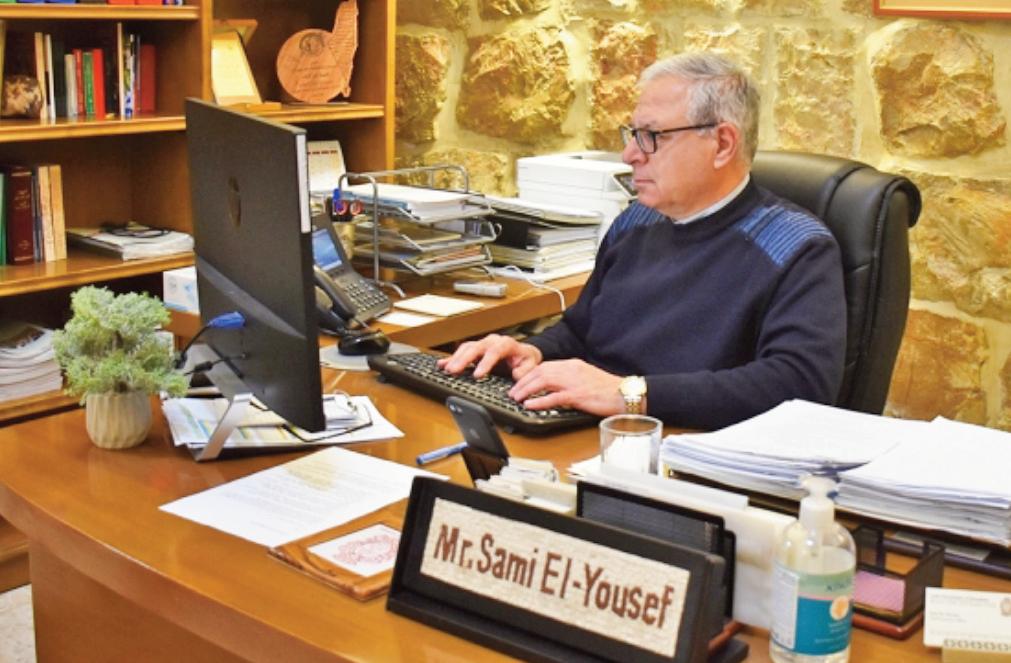
Gaza, which is only part of the story. The human tragedies we hear about daily including amputation operations without anesthesia, are simply too much to bear. Humanity is lost in Gaza!
The situation on the West Bank is no less dire with unemployment reaching record levels estimated at 45% without much hope of resuming much activity to revive the tourism/pilgrimages industry, nor any breakthrough to the return of the Palestinian workers to jobs in Israel, nor the release of tax revenues to the Palestinian Authority to allow it to pay salaries to its civil servants. The economic conditions of most families severely worsened in recent months with any savings put aside for a dark day for most families now depleted with the passage of time. A further complicating factor has been unchallenged settler violence deeming many roads on the West Bank unsafe, let alone the increasing attacks and massive land grabs. Checkpoints have become unbearable as I witnessed firsthand such cruelty a few days ago. After attending a meeting in Ramallah, returning back to Jerusalem which is a 16-kilometer ride took over 4 hours! I can only sympathize with people who need to make such journeys on a daily basis!
As for our work at the LPJ, given the high bar his Beatitude has set for all of us, all departments are working very hard to be of support to our suffering communities whether in Gaza or on the West Bank. In Gaza, the priority continues to be to sustain the livelihood of all refugees under our care at the Holy Family parish complex as well as our sister Orthodox Church and immediate Moslem neighbors. This included adequate supplies of food, water, medicines, personal items, and fuel supplies to roughly 1,000 people on a daily basis. That has been a huge undertaking given the lack of humanitarian deliveries, especially to the north, and the need to buy supplies at black market prices that are 10-20 times their normal pre-war prices. On the West Bank, in addition to continuing pure humanitarian support including food coupons, rental and utilities support, medical support, and tuition support reaching over 12,000 beneficiaries, the focus has been on job
creation programs including internships, cash for work programs, and income generating projects. To date, hundreds of opportunities have been created to assist thousands of individuals. With generous funding by many outstanding donors, we shall continue these programs for the next few months, benefitting many institutions along the way where interns are placed, or projects implemented including elderly homes, schools, orphanages, and other service providers.
Once the war is over, the Church has big dreams not only to re-establish its institutions and the services it provided before the war but potentially to expand such services in other areas where the need is greatest. The recent Memorandum of Understanding signed with the Sovereign Order of Malta aims at the delivery of life-saving food and medical help to the population in Gaza. Other partnerships are being explored to enable the Church not only to restore its previous operations in Gaza but to also expand such services to help meet the staggering needs and help in rebuilding the community in Gaza. The return of Fr. Gabriel Romanelli, parish priest of Gaza after being stuck out for over seven months will bring in much-needed support to the heroic work of the religious already there but also bring in new energy and enthusiasm for our work there with focus and priority given to restart some educational process to our students after having lost a school year. Our prayers and best wishes go to Fr. Gabriel as well as Fr. Yousef who single-handedly took the brunt of the work so far as well as the Sisters of the Incarnate Word and Daughters of Charity who have been heroically supporting our brothers and sisters.
A huge thank you to all those who have supported our collective work with your financial support, but more importantly the encouragement, solidarity, and above all your prayers. We could not have done it alone and we look forward to continued collaboration. Let us hope that some sanity will return, and this ugly war will come to an end soon so that humanity and dignity are restored to our region and eventually justice and peace prevail!
Sami El-Yousef, Chief Executive Officerstjudeshrine.org.uk
“Thank you for a lovely celebration on Friday. It was such a nice way to open that footpath. Even with the rain it was still enjoyable.”
After ten years of planning and three months of building, a new path called the ‘Footprints of Hope’ was officially opened on 31 May 2024 at the Shrine of Saint Jude in Faversham, Kent. It was opened by the Mayor of Faversham, Cllr Josh Rowlands with the Prior Provincial of the British Carmelites, Fr. Brendan Grady, O.Carm. The ‘Footprints of Hope’ path is made from individual bricks donated by the friends of the Shrine and the Carmelites with a message on each one.
Over eighty friends of the Shrine who had donated for their own special brick attended the ceremony. One pilgrim said: “Thank you for a lovely celebration on Friday. It was such a nice way to open that footpath. Even with the rain it was still enjoyable. Thank you for all the planning and effort that went into making it all possible." After the opening, each supporter either sought out their special brick or bricks or enjoyed some of the refreshments.
Back in 1955, Carmelite friar, Fr. Elias Lynch, founded the Shrine of Saint Jude for two reasons: first, because he was responding to
the needs of the post-war generation who were looking for hope, and secondly because the Carmelite charism is so deeply rooted in the Word of God. It is therefore fitting that there is a place dedicated to Saint Jude - the Apostle of Hope. Both of Fr. Lynch’s initial reasons are still realities in 2024, and pilgrims find the Shrine to be a place of prayer, peace, and hope. In 1955, Jude was very much the forgotten Apostle, which is why people often turn to him when they feel forgotten. However, thanks to the foresight of the Carmelites in England, sixty-nine years ago, Jude is no longer the forgotten Apostle in these isles. Jude enables us to remind ourselves that no-one is forgotten by God. God is our Hope, Jesus is our saviour, and Saint Jude is our friend who reminds us of all of this.
Thank you to the Mayor of Faversham, the team at the Shrine Office, our volunteers, the Faversham Community, the Reading Community, the Prior Provincial, John Toryusen, Mick May, and all the friends of Saint Jude.
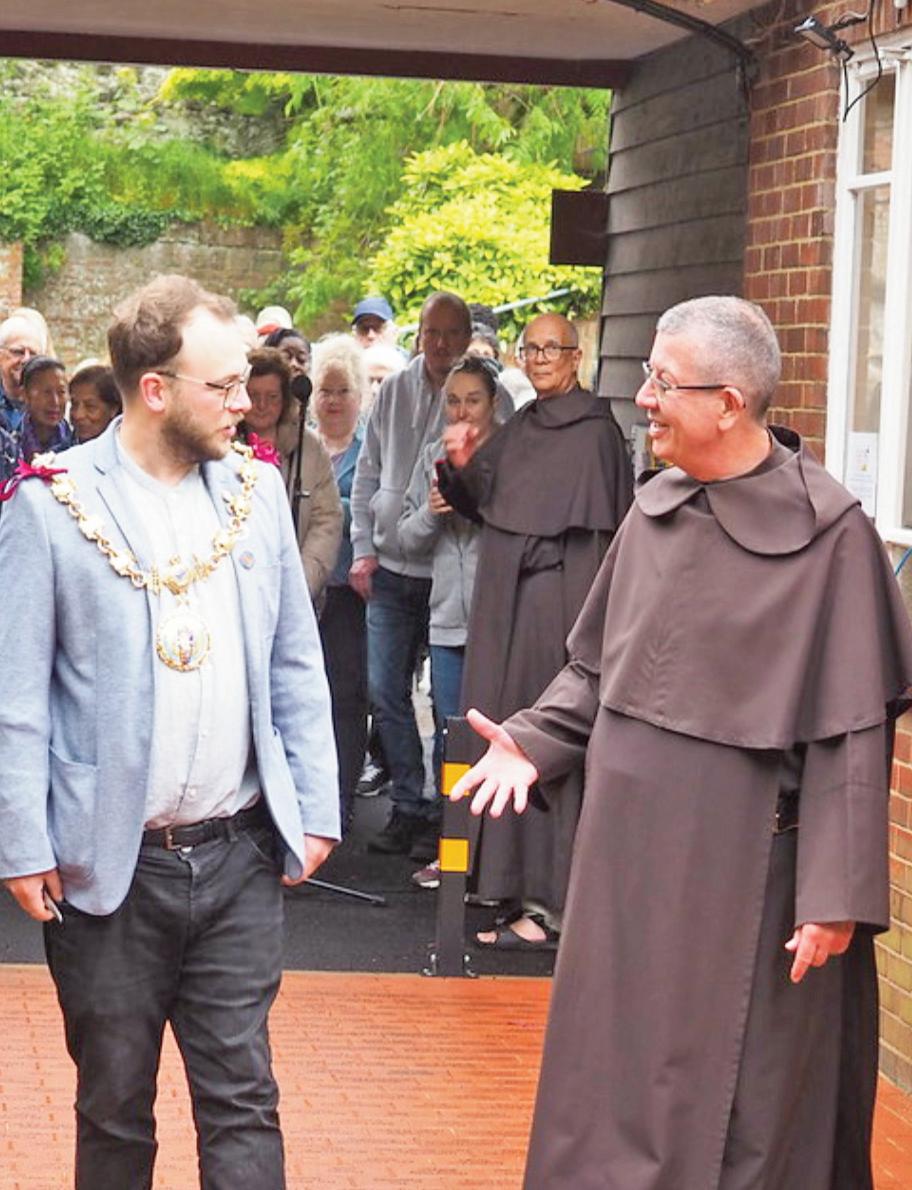

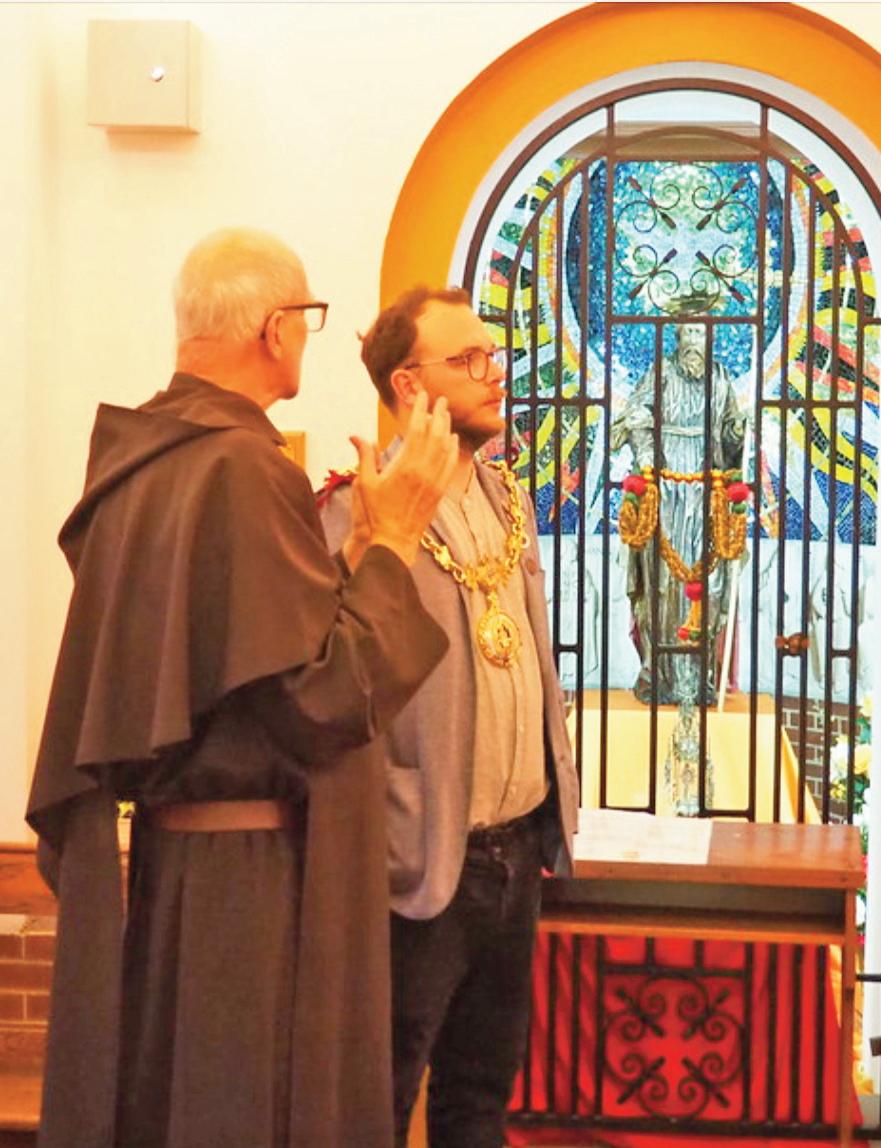
vaticannews.va
“If parents argue, it’s normal, but they should make peace before the end of the day because the cold war the next day is terrible,”
For his third appointment of the 'School of Prayer' preparing for the 2025 Jubilee, Pope Francis meets an unsuspecting group of about 30 families in a Roman condominium garage from a parish in the city's western outskirts, and acknowledges that while fighting is normal, to try to make amends.
By Salvatore CernuzioThis time the venue was not a parish hall or theater, but rather a condominium garage with a gravel floor, brick walls, trees and ivy all around, with shutters hiding parked cars and residents peering from balconies.
At the center was an armchair, in front of which sat about thirty families, couples with children, young people, and parishioners from the nearby Church of St. Bridget of Sweden, some of whom arrived after the meeting had already started, wearing slippers or house clothes.
Among them, was a lady who rushed down the stairs trying to fix her hair. “Oh my God, what a surprise, you could have told me earlier!”
And thus, he had an entirely new setting for the third session of the "School of Prayer," a series of meetings by the Pope in Rome during the Year of Prayer in preparation for the 2025 Jubilee Year.
After meeting children and teenagers at the other 'School of Prayer' encounters, Pope Francis wanted to meet families in the Palmarola neighborhood in Rome's Borgata Ottavia area, in the extreme western outskirts of the city.
There were new parents, grandparents, the parish youth group, infants and children with pacifiers, a group of women from Senegal, an Orthodox man, and the district president.
In short, to welcome him was a diverse humanity that was informed at the last minute of this special hour of afternoon catechism.
The arrival and surprise
The Fiat 500L made its entrance around 5 PM on the ramp of a building on Via Palmarola, with walls still under construction. There was an initial silence, a few wide-eyed glances, and

some smartphones ready to capture the scene, as Pope Francis greeted: “Good evening, everyone,” followed by applause and the usual “Viva il Papa!”
The journey through the crowd was brief, marked by handing out candies, some quick selfies, and a lady stepping forward to ask, “Would you perhaps say a prayer for my mother?” to which the Pope blessed her.
Seated in the armchair, the Pope then introduced a Q&A session with the attendees.
First, he looked amused at the unusual setting: “The wall… the plants… the tomatoes…,” then greeted the group before him: “You are families, young people, less young, elderly, always the family.”
The Pope spoke about family, its challenges and difficulties, its beauties and potentials for the Church and society, both in what he jokingly called a “sermon” and in the subsequent 45-minute Q&A session.
“Let’s defend the family, which is essential for raising children,” he said, as he acknowledged a certain inevitability of arguments, discussions, and sometimes separations, which he called “storms,” that shouldn’t discourage.
“If parents argue, it’s normal, but they should make peace before the end of the day because the cold war the next day is terrible,” he repeated several times, emphasizing the three key words, so simple yet, as he has repeated throughout his pontificate, so essential for making a relationship work: “Sorry, please, and... thank you.”
Even the simplest thanks makes a difference, the Pope noted.
“Thank you for cooking this good dinner…” And when words fail, he invited those listening to offer a small gesture to rediscover peace and start fresh the next day.
These small daily steps are especially important for children.
“The children are watching us,” the Pope said, quoting the 1944 film by Vittorio De Sica, and reminded that as they watch their parents, they suffer when they are not getting along.
The Pope recommended that separated parents not speak ill of each other but educate their children about respect.
The mandate to young people: carry forward the history
Four young people from the parish then asked the Pope how to increase faith today.
“The only way is through testimony,” he replied, as he gave young people a precise mandate.
“You have the responsibility to carry forward the history,” he said, which requires never remaining down when you fall.
“One of the beautiful things about young people," he suggested, "is that they get back up. We all fall in life, but the important thing is not to stay down if you slip.”
Continued on page 9
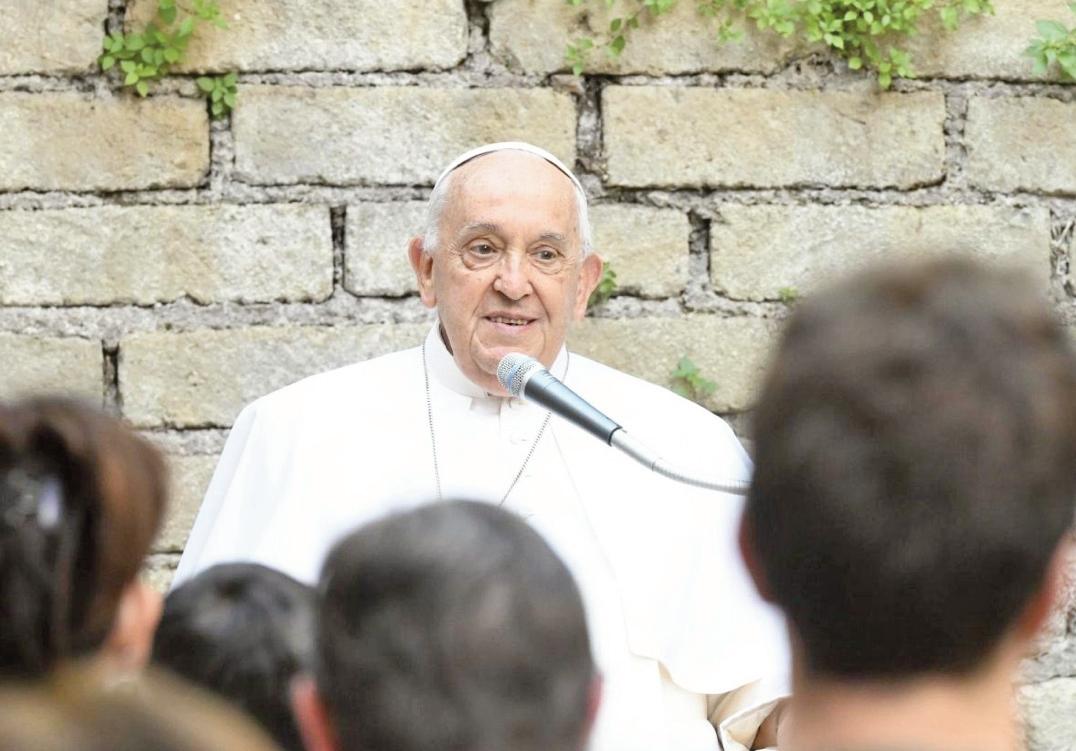
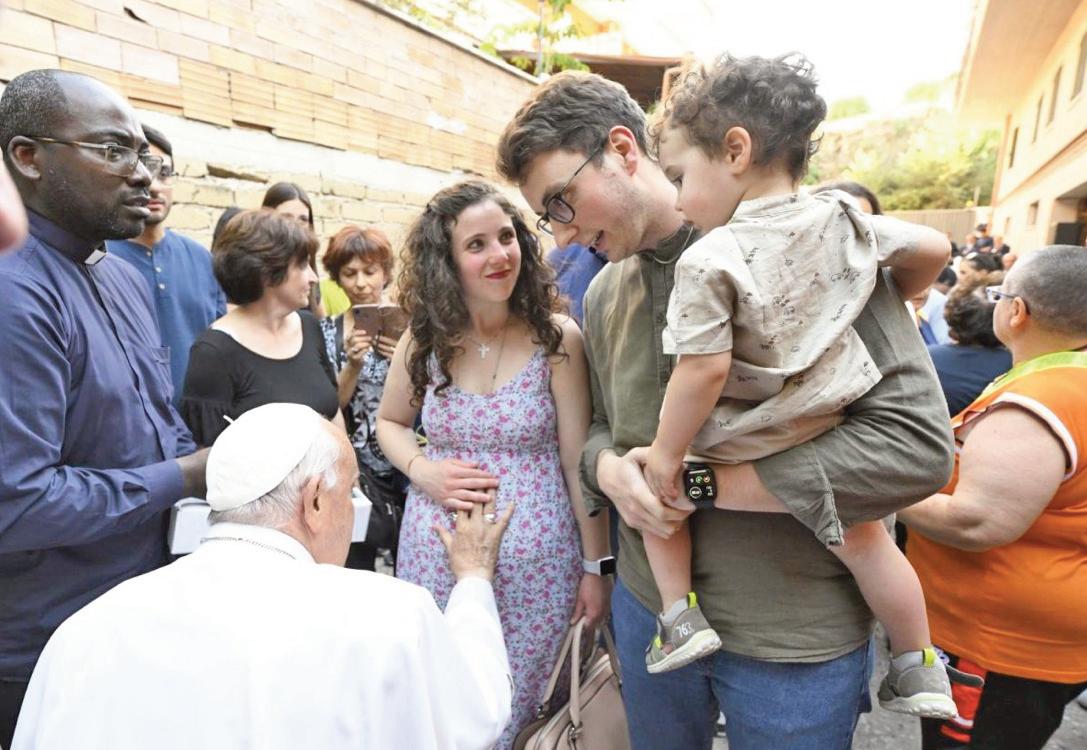
Continued from page 8
One man expressed the desire to have a larger church in that area to serve as a meeting point for all the neighborhood residents.
There was also talk of the Church as a community of people, not just places of worship, which are much less present in this part of Rome than in other areas of the city.
A lady, who warned “I might cry,” expressed her gratitude to the Pope.
“From the World Children's Day, from your speeches, what reaches us is a father who leads a large community in small things, in true things. Seeing you here in front of a brick wall is the most moving thing," she said, adding, "Tomorrow we are having the parish festival, it always rains inside, we don’t even have asphalt, but it doesn’t matter, we’ll do it anyway.
"And your presence here," she continued, "makes us feel that you are part of our community.”
The elderly, wisdom. The children, a promise Amid laughter and applause, Pope Francis connected with this last point: “The Church begins to take shape in the community.”
He once again appealed not to neglect the elderly and to take care of the children.
“A parish where children are not heard and the elderly are ignored," he insisted, "is not a true Christian community. Don’t forget, the elderly are the memory and the children the promise.”
“Don’t forget the elderly who are the memory of God’s people,” the Pope reaffirmed.
“It’s true that the elderly sometimes, rather we, are boring. Always talking about the same things: the war, etc... but we have a great tenderness,” he said, adding that "children understand the language of tenderness.”
Speaking of children, two fathers, one of twins, asked the Pope how to maintain faith in these difficult times and how to raise children close to the Church, even after Confirmation, “the sacrament of farewell.”
“Testimony” is again the answer. Primarily the one born in the family: “The first advice is to love each other as parents,” said the Pope, “because children need to feel that mom and dad love each other. If you have to argue, don’t do it in front of the kids, send them to bed and argue as much as you want.”
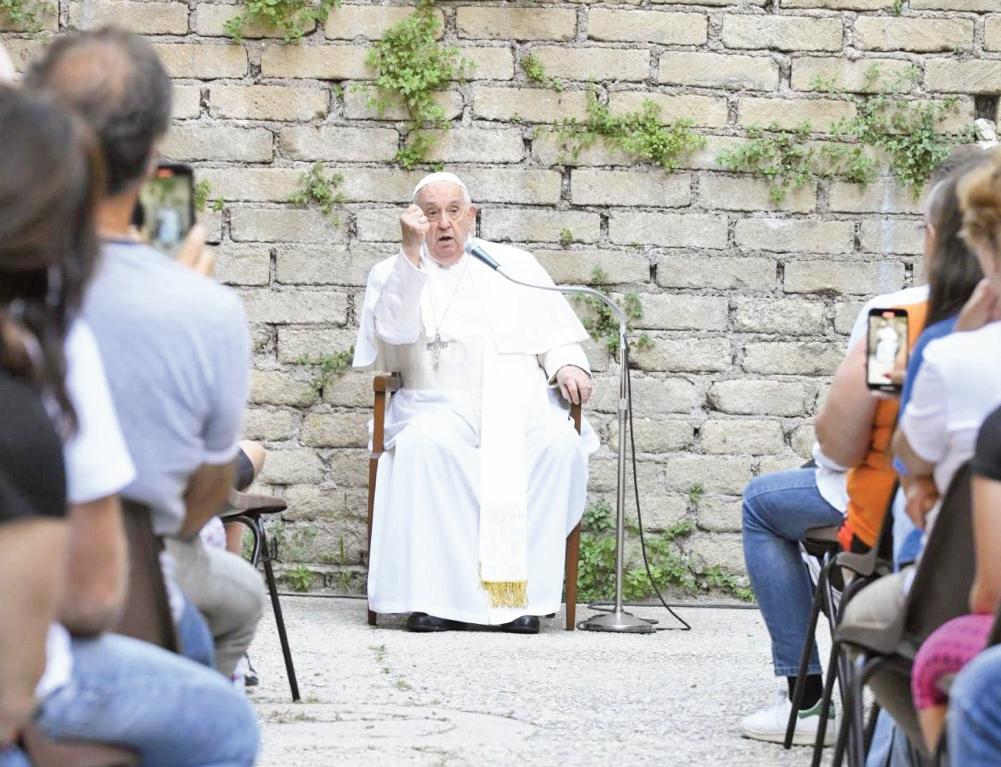
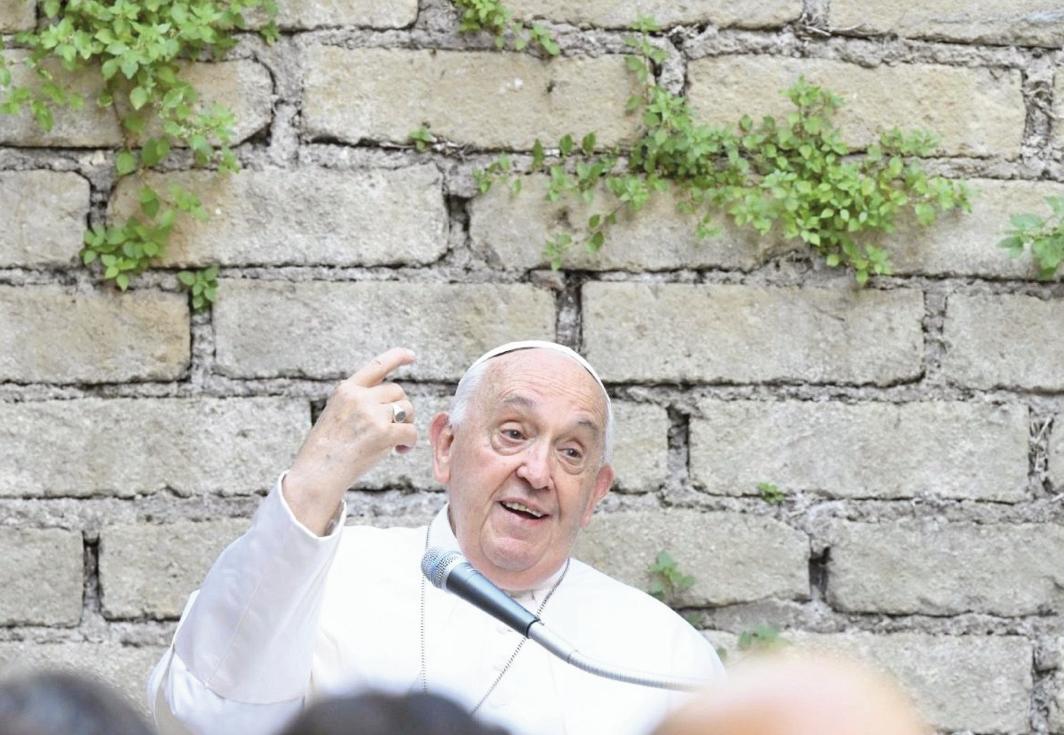
Equally fundamental is dialogue with your children. “Never stop talking to them. Education happens through dialogue,” without “ever leaving them alone,” without scandalizing or pressuring them, but also eventually leaving them free, he said, suggesting this is the best approach.
"Make them understand that they can talk about everything. About everything,” the Pope emphasized.
“Life’s lessons are learned at home," he reminded, "not from others who may teach who knows what.”
The meeting ended with the Pope greeting everyone present, distributing hugs and rosaries, agreeing to various photo requests, and even conversing with “Grandma Maria” via Skype on her grandson’s phone.
“Hello, pray for me!” Pope Francis told her.
As a gift to these families, the Pope left a picture of the Virgin Mary holding Baby Jesus, for them "to keep it in the building,” as a tangible memory of a meeting that none of the residents could have ever imagined.


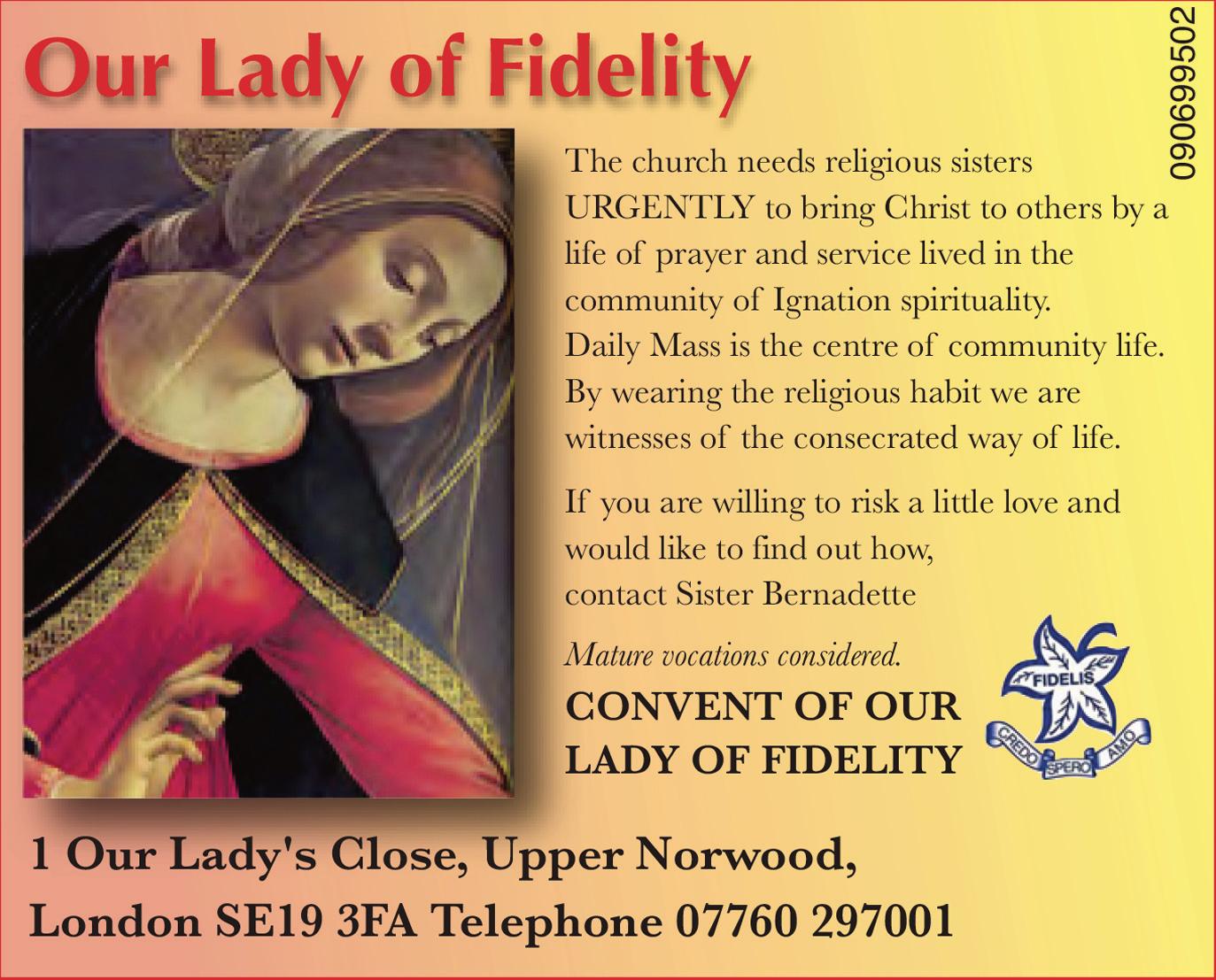

14th July is Sea Sunday.
Please pray for seafarers and fishers and support the Catholic charity ministering to them: Stella Maris (formerly known as Apostleship of the Sea). To donate, go to www.stellamaris.org.uk/donate



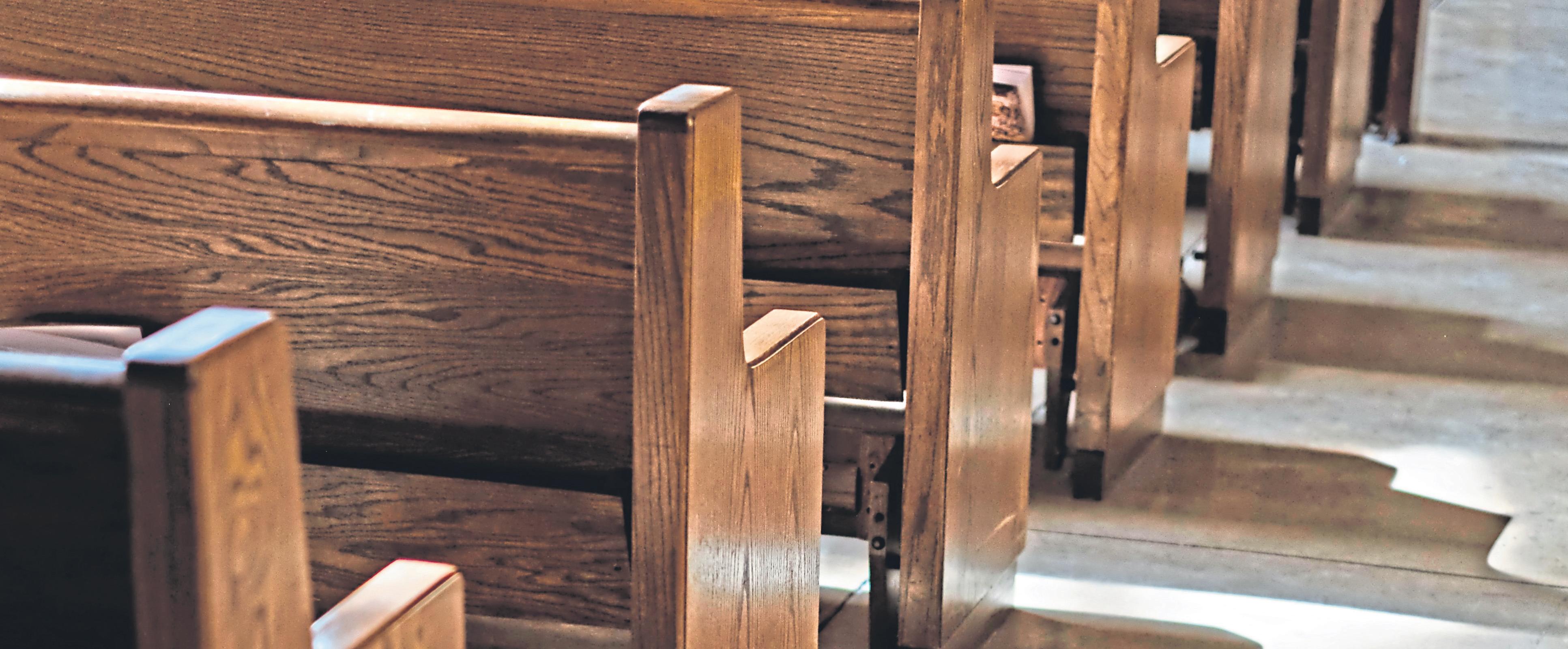

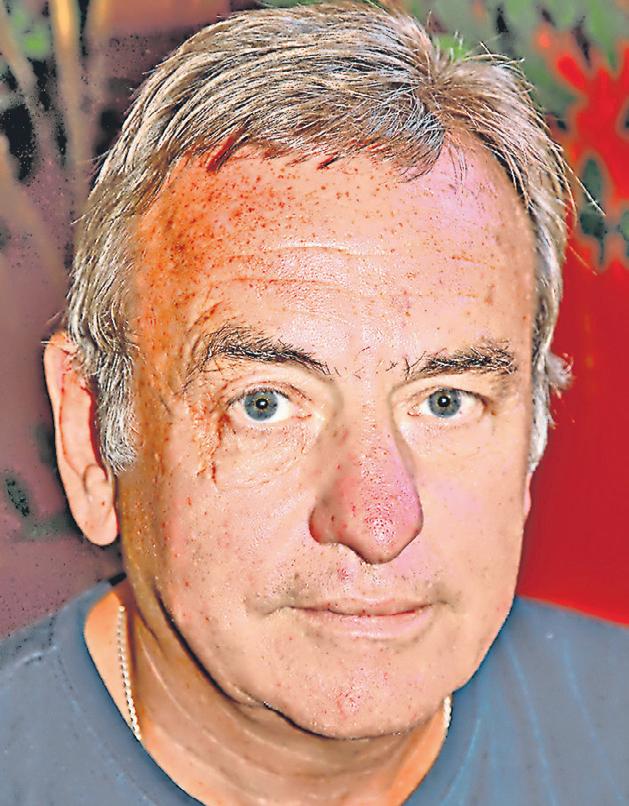
His feast day, Saint George’s Day, is traditionally celebrated on 23 April, the date in 303 of his martyrdom under the Roman emperor Diocletian
The devil is the personification of what numerous cultures and religious traditions consider to be evil. This objectivation extends at times beyond personification into the world of zoomorphism, figuratively giving a person or an inanimate object the characteristics of an animal by way of graphic illustration.
Cue the dragon. Enter St George.
Saint George, also known as George of Lydda, was an early Christian martyr, of Cappadocian Greek origin, and a soldier in the Roman army who has been especially venerated as a military saint since the Crusades (1093-1300) when Christian armies and those of the Muslim empire were at loggerheads. His feast day, Saint George’s Day, is traditionally celebrated on 23 April, the date in 303 of his martyrdom under the Roman emperor Diocletian. The oldest known record of Saint George slaying a dragon is found in a Georgian text of the 11th century.
According to legend, the city of Silene in Libya had been terrorised by a large dragon which had infested the waters of a lake. At first, in appeasement of their enemy, the people of Silene fed the dragon with sheep, resorting subsequently to human victims, eventually selecting the King’s daughter as the sacrificial maiden. George rides onto the scene (pictured). With a quick cut and thrust of his sword he slays the dragon, itself perhaps symbolic of Diocletian who had been persecuting Christians. Being celibate, George

cannot accept the princess’s hand then offered to him in marriage.
Saint George becomes the patron of England, a post for which Saint Edmund the Martyr, a ninth century Anglian killed by the Vikings, and Saint Edward the Confessor had competed. However, it was King Edward III (c. 1003 – 5 January 1066), usually considered the last king of the House of Wessex, who decided on Saint George.
Graphic illustration, as in the image of the dragon, is forged by the combination of visual elements such as colours, lines, shapes, forms and layouts. Our Catholic churches house a host of such in the various teaching aides, statements and aides-mémoire such as we see in the Stations of the Cross, the crucifix, the altar, icons, stained glass, the font, the Pietà and the Sacred Heart among other statues, music, readings and song … not to mention the very structure and layout of the church. Yet our churches are more than just points of reference. With the celebration of Mass they assume what is tantamount to an enactment – almost like a prelude to the Mystery Plays of
yesteryear - a theatrical role involving the participation of the assembled laity under the guidance of the priesthood. Stagecraft and performance are paramount.
In this regard, I’m always amused by the suggestion that the ‘The Hokey Cokey’ song and dance routine is an established parody of the Catholic priest celebrating Mass. Admittedly numerous variants of the song and its related British folk dance do date back to the 19th century, despite claims about the song being a later invention. Robert Chambers’ Popular Rhymes of Scotland from 1842 bears testimony, recording one of the earlier variants.
However, it was not till 2008 that the Anglican cleric, Canon Matthew Damon, Provost of Wakefield Cathedral in West Yorkshire, mischievously came up with the amusing idea – rather tongue in cheek and even perhaps prompted belatedly by Vatican II when the priest in Mass, no longer ad orientem, turned to face the congregation – that the whole routine was a parody, mimicking our traditional Latin Mass which had remained ‘virtually unchanged since the third Century’, as Saint John Henry Newman pointed out, and as such would have been known to St George.
God, of course, gave us our sense of humour. No doubt Canon Matthew and I would immediately agree that it’s a pity not to use it.
Acknowledgements and Attribution: Texts/References adapted and/or adopted from http://en.wikipedia.org under the terms of the Creative Commons Attribution-ShareAlike License 4.0: http://creativecommons.org/licenses/bysa/4.0/; Photograph (on Unsplash) by courtesy of the Art Institute of Chicago (USA).

Dr J L Kettle-Williams is an experienced business communications consultant and wordsmith (tutor, writer, translator).
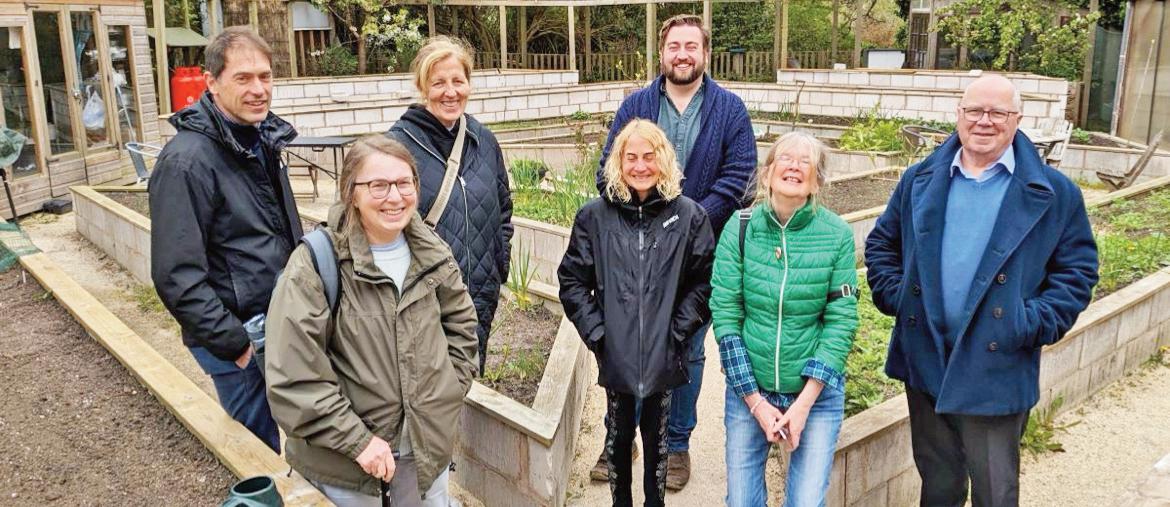
"This document is a one-year plan inspired by Care for Creation, a commitment to environmental action and sustainable living made by the Archdiocese of Liverpool in 2023.”
To celebrate Laudato Si Week, the Archdiocese of Liverpool is launched its oneyear plan for 2024. This sets out what we intend to do, but also captures some of what we have already done.
Most recently, the archdiocese completed a carbon emissions audit. We now have the Carbon Footprint figures for all parish buildings – churches, presbyteries and halls – over 400 properties.
Parishes are now invited to join the Carbon Countdown challenge, where churches can work towards reducing their energy consumption, by doing an audit, keeping an energy diary and making changes to properties.
Our Care for Creation workshops continue to roll out, having been delivered in four deaneries, with a further six awaiting courses.
Writing this article just 9 days into a General Election campaign I am aware that the days and weeks prior to polling day will be dominated by personal actions as well as disagreements over policy.
The media do not hesitate to report on individual politicians if they appear to be news worthy especially if it is of a controversial nature. With regard to policies these are often promoted when it is “fully costed”. After a long campaign I just hope that our would be MPs have been honest with the electorate in recent weeks. Fully costed implies that our economy can really afford to bring about changes but all too often that is not the case.
Speaking on Divine Mercy Sunday Bishop
Tom Neylon told a national radio 4 audience of his fears that more than 30
wars were being activated in our world. I recalled my first Parish Priest telling a school audience that “wars are caused by sin”. This was in 1953 and I fear it is just as true today.
We know that cyber actions are sadly likely to be relevant in those wars and that conflicts can lead to persecutions with refugees which inevitably bring about immigration issues. `immigration was a huge area of disagreement in this election. At times compassion seemed lacking.
In last month’s article I mentioned the issue of foreign aid to parts of the world in greatest need. When a grave disaster occurs the DEC group of charitable causes work together with the Government. There are some who only seem to speak of aid being wasted surely with all we know about climate change some fresh thinking is necessary.
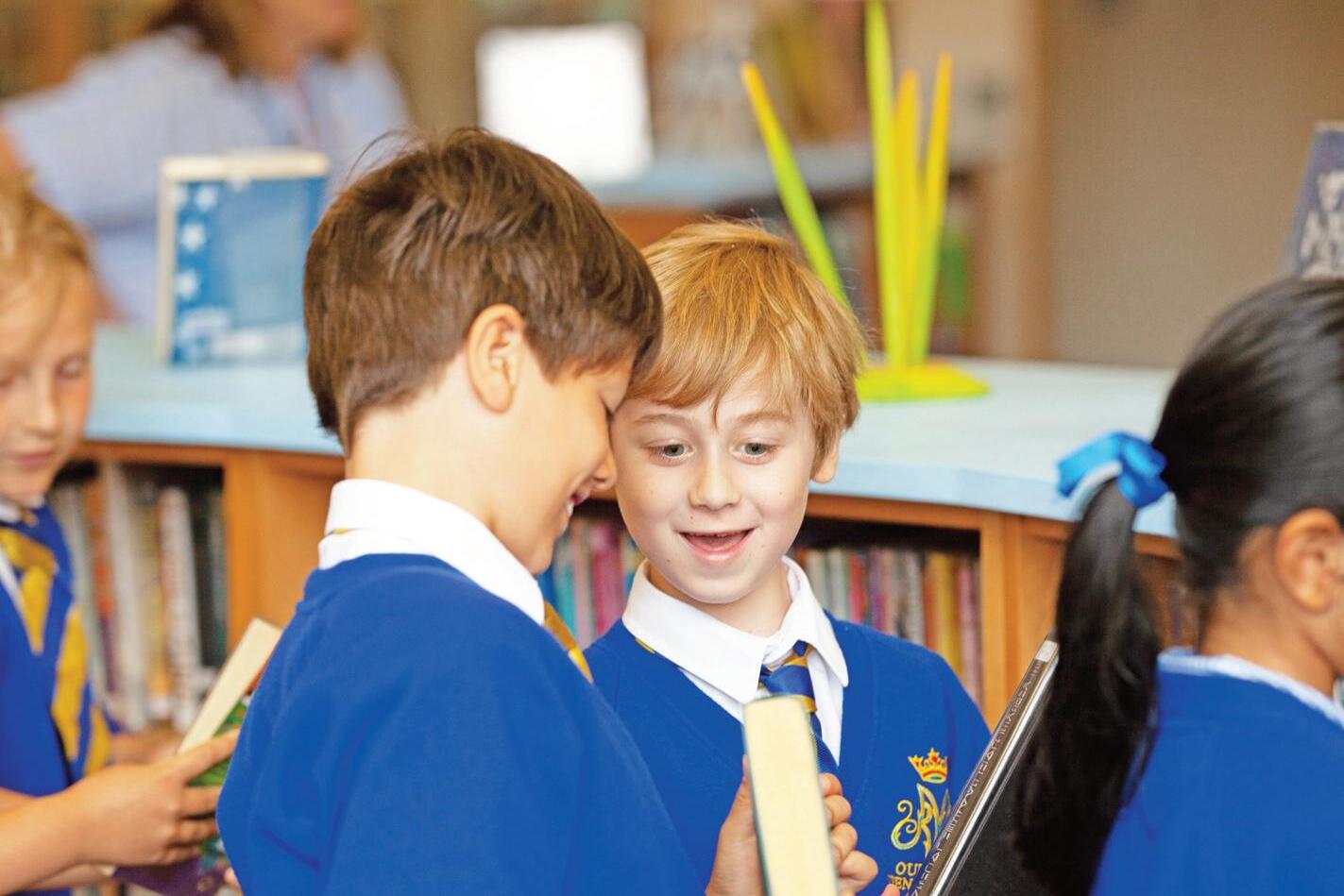
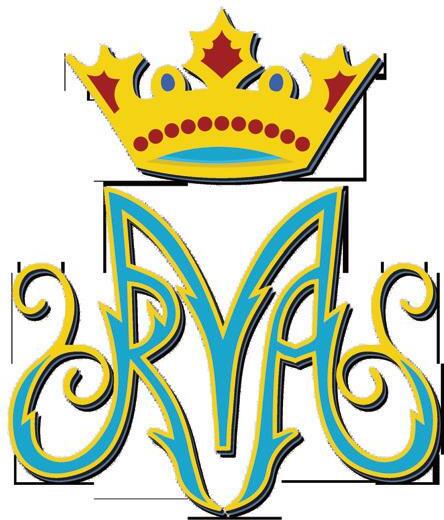


Social Action Coordinator Pablo said: "This document is a one-year plan inspired by Care for Creation, a commitment to environmental action and sustainable living made by the Archdiocese of Liverpool in 2023.
"Care for Creation captures our belief inbuilding a sustainable future that brings us closer to creating God’s heavenly kingdom on earth. It has been informed by all the good work that has happened until now, in homes, in parishes, and across the archdiocese.”

In the last Parliament both the House of Commons and the House of Lords debated the plight of Christians who are being persecuted in large areas of the world.
Sadly there were not many MPs or Peers present to witness these expressions of deep concern. Many sections of our media also gave little or no concern. Many sections of our media also gave little or no coverage to brave Christians who are often in danger of their lives. In our country we have a heritage traced from Saint Augustine and Saint Bede the Venerable.
Christianity needs to be part of our future as well as our past, we should all be involved with this whoever is elected to govern at Westminster.




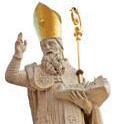















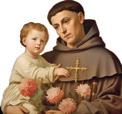






For children making their
First Holy Communion this year, an archdiocesan-wide badge competition offered an extra cause for excitement in the build-up to this always special day
“It is a rite of passage of every Catholic child.”
So Monsignor John Devine sums up one of the more joyful occasions on the May Calendar of every parish in the archdioceseFirst Holy Communion season. This special day - unfolding, for the lucky ones, in latespring sunshine - has always had the power to create life-long memories for children as they take the Sacrament of Holy Communion for the first time.
Indeed, Mgr John, who celebrated his golden jubilee as a priest last year, still has clear memories of his own First Communion Day at Christ the King church in Childwall in the 1950s. “I had two shredded Wheat for my breakfastnormally, I ony had one!” he recalled. “I was wearing a little grey suit - a jacket with matching short trousers - with a red tie and white shirt. It was the feast of Corpus Christi, a holy day and my dad, who worked in the Inland Revenue, took the day off. We went off in the car to Thurstaston Hill on the Wirral.”
The sense of occasion remains the same for children and their families today and for 2024’s communicants in the Archdiocese of Liverpool, there was an extra layer of excitement in the form of a newly introduced competition to design a First Holy Communion badge. In January, all children in the archdiocese preparing for the sacrament were invited to design their own badge according to the following criteria, it had to be the size of a 2p coin and contain no more than five colours. The winning design, from around 400 submitted, came from St Joseph’s Catholic Primary School in Leigh.
Explaining how the competition was devised, John McMahon, head of finance for the archdiocese and a member of the badge judging panel said, “Our original idea came from a discussion about the wonderful badges created since 1923 for the annual Lourdes pilgrimage. We imagined a scenario where First Holy Communions were marked in the same way and so we invited the children preparing for Communion to submit their own designs to our competition.’
Harriet Anwyl, another panel member and our archdiocesan communications officer, added, ‘We wanted something really personal for them to keep forever, something that really represents what their First Holy Communion means to them.
‘We were overwhelmed by the quality - there were some absolutely fantastic ideas. Some
children included a little written explanation of their badges, so they’d clearly given it a lot of thought. It was very difficult to choose just one - each one of our judges had a handful of favourites - but we ultimately felt the winning design captured everything succinctly, with the cross in the background reminding us why we take Communion, the wine, and the Host above it.’
The winning design was by a Year 4 pupil from St Joseph’s, Michalina. Her headteacher, Michelle Daley, said, ‘We’re all very proud of Michalina’s achievement - we love her design! This fantastic news has made this special occasion even more memorable for our Year 4 children, who are just delighted that the winner is not only from their school but also their class. Michalina is a hard-working and kind pupil who lives out our mission statement every day - in short, a very deserving winner!’
Changes down the decades
If this year’s badge competition is a new initiative, certain aspects of First Holy Communions remain the same - such as the girls’ white dresses and the boys’ red ties. Yet amid the traditions, there have been gradual changes too. Mary Coghlan, a long-serving catechist at Christ the King parish, explains that she was six when she had her First Communion, today, communicants are children from Year 4 at primary school, which means they are eight or nine years old.
As Mary explains, the preparation process, if still centred on the children in their school, now includes their families more than in the past. In the case of Mary and her fellow catechists at Christ the King, they arrange a series of sessions for children with their parents, stages from autumn through to spring.
She explained, ‘Before, it was mainly done in the schools, and then we started bringing it into the Church and making it a family thing. If you go back all those years, a lot more families were practicing, whereas now a lot have fallen away from weekly Mass attendance, so across the year we have six sessions, when the parents come with the children.’
According to Mgr John Devine, the greater involvement of families extends to the First Holy Communion Day itself. ‘We try to encourage families to come up and achieve with them. Aunts, uncles and grandparents all show up and they make a big effort and make it an occasion for the kids. That’s where we need to meet people and build on that.”
As for exactly how to build on it, Mgr John offers the following perspective, ‘It is the first

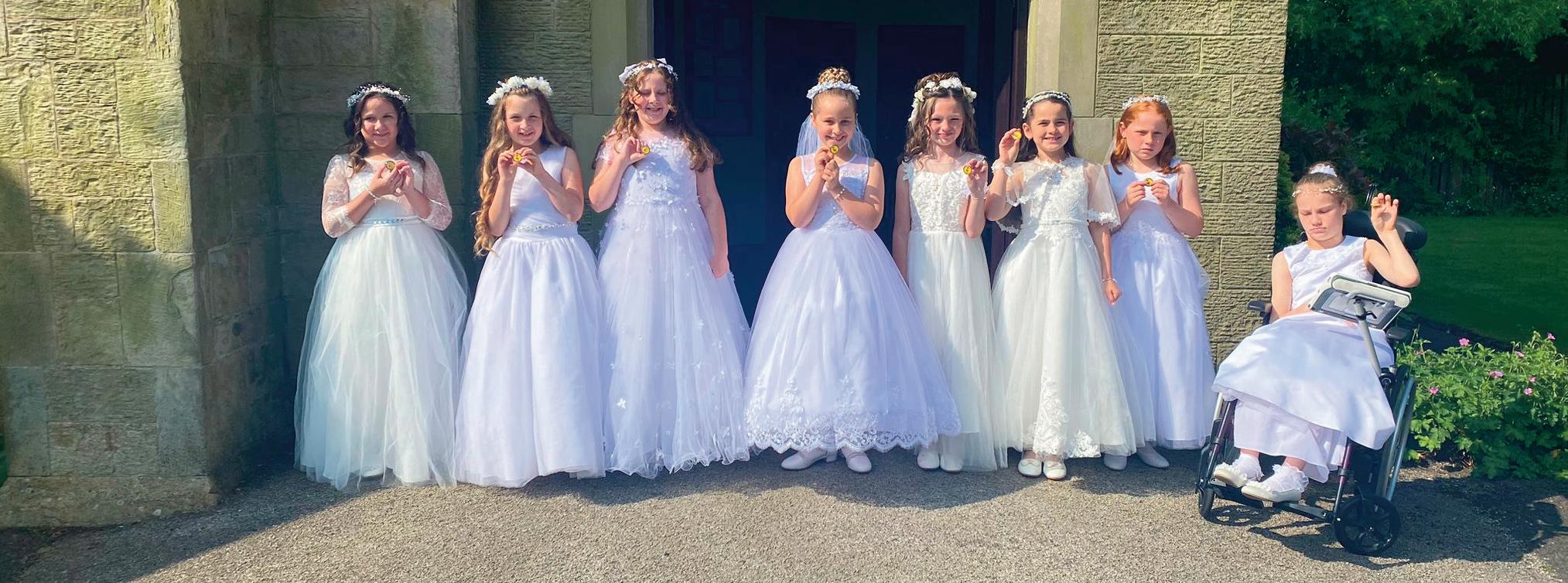
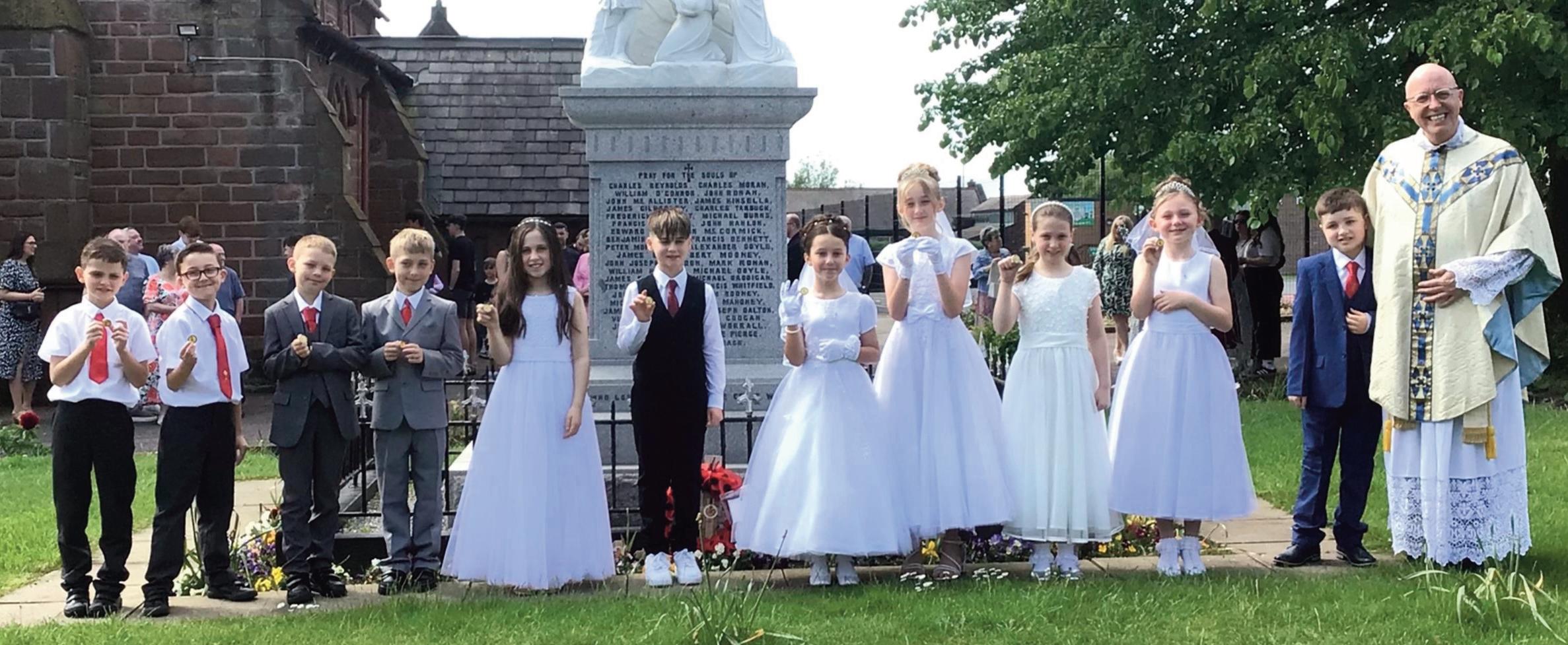
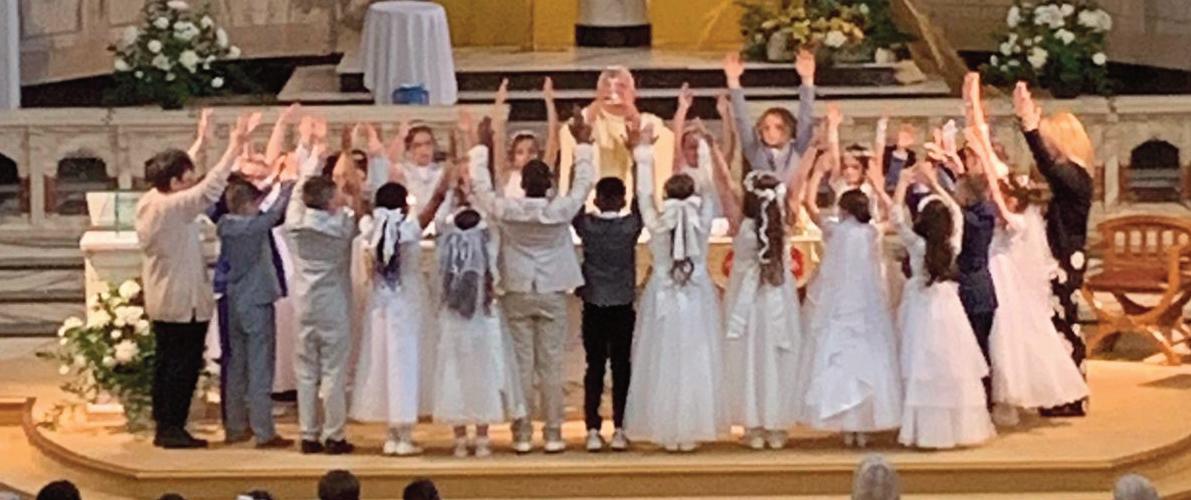
chance that kids have something to do for themselves after their Baptism. First Communion is an opportunity to be consciously participating in the life of the Church.
I say to them it’s a sign they are grown upsthey can now join in the celebration of the Eucharist, which is a sign Christ’s presence and His promise to be with them every day of their lives from now into the future and that God loves them no matter what they do. That is what they are celebrating.
‘As for whether people choose to live out of their faith in the future is perhaps beyond my
paygrade really - leave that to the Holy Spirit.!’
On this question of the legacy of the First Holy Communion Day, Mary Coughlan ends with a lovely tale about a former communicant from years past. “I prepare the children who don’t attend Catholic primary schools and not long ago I was walking around town and man came up to me and said, “You prepared me for my First Communion”. He’s in his 30s now and he said. “I loved those times, and I persuaded my parents to put me in St Edward’s and from there I joined the Cathedral choir, and I am still singing in it!”
“When
you manage to bring intelligent smiles to the lips of even a single spectator, you also make God smile.”
Pope Francis met with more than 100 comedians from around the world, encouraging them to cheer people up and help people see reality with all its contradictions.
Comedians are among the most well-loved and applauded entertainers, Pope Francis said on Friday 14 June, because they “have and cultivate the gift of making people laugh.”
With so much “gloomy news,” in the midst of both public and personal crises, comedians are able to spread “serenity and a smile,” and are among the few who can speak “to very different people, of different generations and different cultural backgrounds.”
Precisely because “laughter is contagious,” it
‘Called
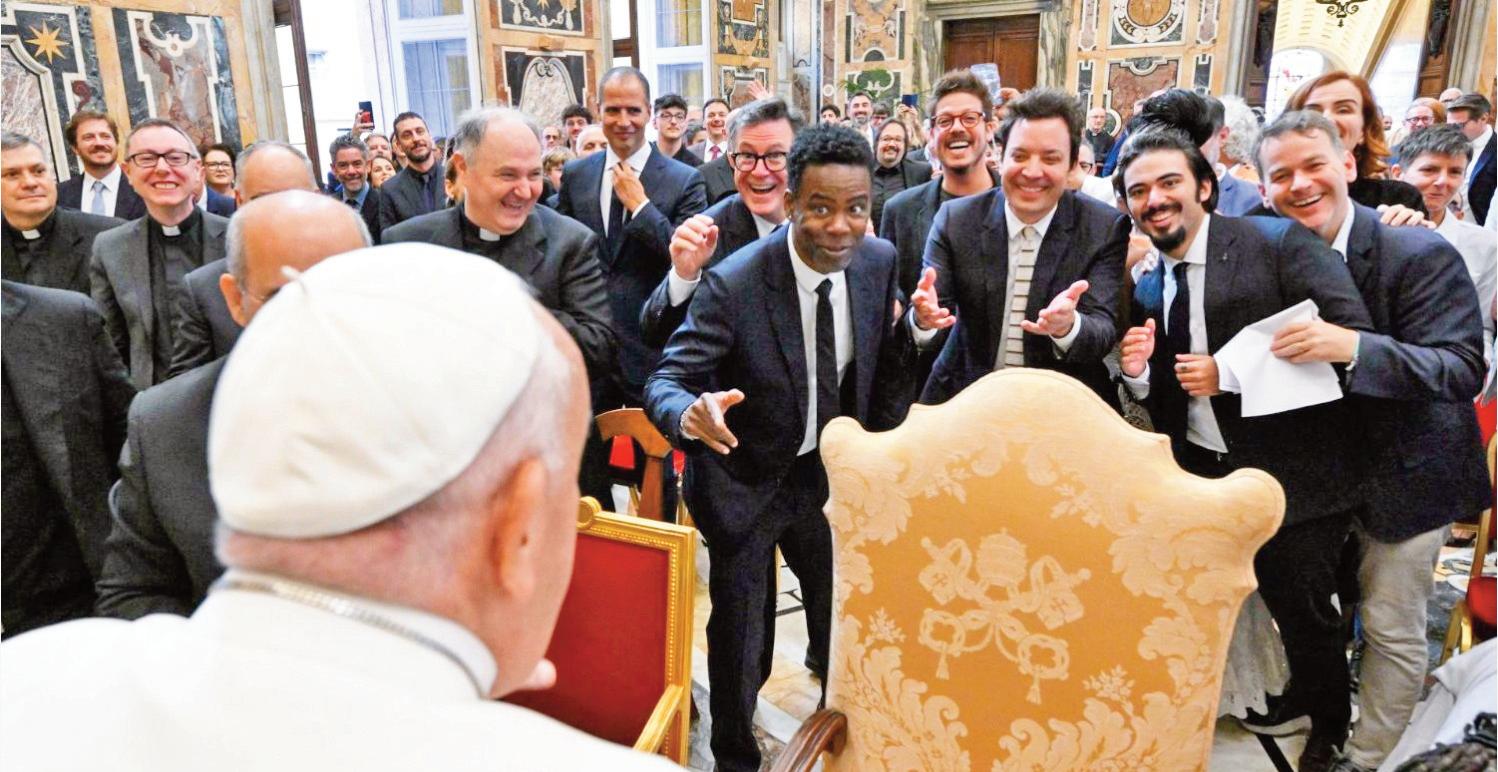
can “break down social barriers and create connections,” the Pope said, noting that comedians remind us that “playful fun and laughter are central to human life.”
A precious gift
Pope Francis told comedians they are in possession of “a precious gift,” that can spread peace “within hearts and between peoples, helping us to overcome difficulties and cope with daily stress.”
The Holy Father went on to highlight another “miracle” of comedians, the ability to make people smile even when tackling serious issues. “You denounce the excesses of power, give voice to forgotten situations, highlight abuses, point out inappropriate behaviour… but
“There’s an urgent need for us, as Christians, to advocate for an end to violence and war in our world today,”
A new document on disarmament and the ethical use of weapons has been released by the International Affairs department of the Catholic Bishops’ Conference of England and Wales.
Called to be Peacemakers is a document that presents a Catholic approach to arms control and disarmament.
The document argues that if Catholics are to take up Christ’s call to stand as peacemakers in our troubled world, an integral part of this mission involves working to limit the proliferation of weapons and to advance the cause of global disarmament.
“There’s an urgent need for us, as Christians, to advocate for an end to violence and war in our world today,” said Bishop Nicholas Hudson, newly-elected Chair of the International Affairs department. “More than 140,000 people are killed each year due to
armed conflict, not to mention the wider impacts of war, such as restricted access to clean water, food, healthcare and basic services.
“Called to be Peacemakers presents the arguments for disarmament – in terms of both conventional and nuclear weaponry – through a Catholic lens informed by Catholic social teaching.
“Vast sums of public money are spent on weaponry. One can legitimately argue that these funds could be better used to alleviate hardship and promote the common good of humanity.
“This is a challenging time for the global community and we are called to promote peace and unity among nations – both seeking an end to war and at the same time addressing some of the greatest humanitarian challenges of our time such as the impact of climate
without spreading alarm and terror, anxiety or fear,” he told them.
Making God smile
Taking a mystical turn, Pope Francis pointed out that in creation, “Divine Wisdom practised your art for the benefit of none other than God Himself, the first spectator in history,” with God delighting in the works that he had made.
“Remember this,” he told comedians. “When you manage to bring intelligent smiles to the lips of even a single spectator, you also make God smile.”
Never ‘against’ anyone
He emphasized that thinking and speaking with a sense of humour help us understand and get a sense of human nature. Humour, the Pope said, “does not offend, does not humiliate, does not ‘nail’ people to their faults.”
change. No country acting on its own can solve these problems.”
Called to be Peacemakers stresses that every human life lost to violence and conflict is a tragedy for our universal family. It examines three main areas:
The Church’s call for nuclear disarmament
We have a particular responsibility to respond to Pope Francis’ call to counter the logic of fear with the ethic of responsibility, to foster a climate of trust and dialogue.
The Church’s call for General and Complete Disarmament
This does not mean the removal of literally all weaponry and defence capabilities. Rather, it is about eliminating weapons of mass destruction, regulating conventional arms, lowering military spending, and strengthening mechanisms for peace.
The Church’s call to put emerging technology at the service of humanity
Until a binding treaty ensuring the human supervision of lethal autonomous weapons systems is negotiated, the Church supports enforcing a moratorium on the development and use of such weapons.
Each of these sections concludes with a series of action points.
Co-author Bishop William Kenney, a long-term opponent of nuclear weapons, said that
Unlike other forms of communication, he argued, humour is “never ‘against’ anyone, but is always inclusive and proactive, and arouses openness, sympathy, and empathy.
In fact, the Pope said, “we can even laugh at God, just as we play and joke with those we love.” But, he said, this must be done without offending the religious feelings of believers, especially the poor.”
Dreaming of a better world
Pope Francis concluded his address by blessing those present and their art. “Continue to cheer people up, especially those who find it hardest to look at life with hope,” he said. “Help us, with a smile, to see reality with its contradictions, and to dream of a better world!”
By Christopher Wellscourageous decisions should be taken on a global scale: “I would echo Pope Francis’ call that now is the time to counter the logic of fear with the ethic of responsibility. Nations have a right to defend themselves, it is even in the Gospel, the man who keeps watch will stop the burglar coming. But that right should not be extended. Global cooperation is needed when it comes to meaningful disarmament, and we must foster a climate of trust and sincere dialogue.”
The department bishops are also concerned about fast-developing autonomous weaponry and the ethics around how they are used, particularly weapons programmed to identify and attack targets without the need for further human intervention.
Bishop Declan Lang, former chair of the International Affairs department, said: “Globally we have been too slow to acknowledge the immorality of different forms of weaponry such as Chemical or Blinding Laser Weapons. We must learn from this and work towards a global moratorium on the development and use of Lethal Autonomous Weapons Systems (LAWS). We cannot abdicate our moral responsibilities.”
You can read or download Called to be Peacemakers www.cbcew.org.uk/called-tobe-peacemakers/
in Britain
The Doomsday Clock, which symbolises the likelihood of a human-made global catastrophe, currently sits at 90 seconds to midnight, the closest to catastrophe it has ever been.
Nagasaki must be the last city in the world to ever experience an atomic bomb, two atomic bomb survivors said as politicians reaffirm their commitment to a nuclear deterrent 'triple lock.'
With the Peace Boat's Voyage for a NuclearFree World docking in London, two survivors of the bombings of Japan by the USA called for a nuclear-free world at a gathering in Friends House, London, last weekend.
Toshiko Tanaka and Tadayoshi Ogawa represent some of the last living Hibakusha, 11,000 remaining survivors of the atomic bombing of Hiroshima and Nagasaki, who are an average of 85 years old.
As the last generation able to share the experience of a nuclear weapons strike,
Tadayoshi said that the use of nuclear weapons is an act against humanity.
The bombing of Hiroshima and Nagasaki on 6 and 9 August 1945, killed between 129,000 and 226,000 people (most of them civilians), and left many more dealing with radioactive fallout and emotional wounds.
'I would like to tell the people they call "world leaders", who are interested in their own national interests… that in fact we live on something akin to a spaceship; a ship where we can spend our time fighting over borders, over resources, and if we do so then the spaceship and the life on it will suffer," said Toshiko.
"Instead, my message is that of reason, sharing and collaborating; of recognising how much


more we can do, how much better we can do, by co-operating with each other to better manage this spaceship Earth, instead of thinking along the divisions of national borders."
The event was organised by Quakers in Britain, CND and Japan-based NGO Peace Boat, which organises global voyages to promote peace, human rights and sustainability.
It included a dramatic performance by Michael Mears (who created The Mistake), and the opportunity to fold peace cranes and paint anti-nuclear symbols.
The Doomsday Clock, which symbolises the likelihood of a human-made global catastrophe, currently sits at 90 seconds to midnight, the closest to catastrophe it has ever been.
"In this time of unprecedented global danger, concerted action is required, and every second counts," said the Bulletin of the Atomic Scientists who set the clock.
Quakers view weapons of mass destruction to be immoral and illegal and work with other organisations, policy-makers and civil society to rid the world of nuclear weapons.
Six at the time of the blast, Tanaka lived very close to the hypocentre of the blast but moved
2km away just a week before the bombing. All her classmates were killed. She was so badly burned and covered in ash that her own mother didn't recognise her, and she was unconscious for several days.
Tanaka still remembers the taste of the dust that filled her mouth when the bomb exploded, and the smell of bodies being cremated all around the city. She suffered constant fevers and headaches. When she had her first child her husband was scared because many babies of survivors suffered birth defects - when the baby was born, he checked their fingers and toes.
Ogawa was an infant at the time of the blast. Born just 1km away from the hypocentre, he was a few kilometres away at the time of the bombing. When his father returned to their home, he found it destroyed and his relatives dead - he had to cremate them himself.
A photographer, Ogawa runs a project called 'Lest We Forget' - on 9 August every year at 11.02 (the time of the bombing) people take photographs of anything they hope will be preserved for future generations and submit them. He hopes to gather 1,000 photos by the centenary of the bombing, and his granddaughter (who is on the Peace Boat voyage with him and was at the event) will continue the project. Please support
The
survivors have been "very resolute, very committed, very resilient in their practice of faith" since the attack.
Two years on, terrorists suspected of murdering more than 40 worshippers during Pentecost Sunday Mass in south-west Nigeria still have not been charged, but parishioners' faith is stronger than ever, say local sources.
Father Michael Abugan - parish priest at St Francis Xavier's Catholic Church, Owo where the massacre took place - told Aid to the Church in Need (ACN) that the suspects are in police custody but have not yet been brought before a court.
On 5th June 2022, extremists opened fire and detonated explosives inside the church at the end of Mass, killing 41 people and injuring more than 70.
Fr Abugan said his parish will be commemorating the second anniversary of the massacre with a special Mass and a talk on martyrdom.
The priest added that the survivors have been "very resolute, very committed, very resilient in their practice of faith" since the attack.
Nurse Margaret Attah - who lost both legs and an eye in the atrocity and has been in a wheelchair since then - told ACN that despite the widespread fear in the community, "the
church is always full on Sundays - to God be the glory".
Mrs Attah said that "there is tension everywhere in Nigeria", with many people "afraid to leave their homes" because kidnapping is common in parts of the country.
She added: "There is no peace of mind. We cannot sleep with our two eyes closed. We cannot even travel short distances without fear. But we still thank God."
She stressed that prayer was people's only hope, and "the future of the country is only God".
She added: "We have to continue to pray to God that his Kingdom should come. It is only God's Kingdom that can reign in Nigeria - that is the only way we can have peace."
Despite the lack of justice, Mrs Attah said that she "found it very easy to forgive the attackers", explaining: "I pray to God to forgive me my own sins, so likewise I have to forgive others."
Mrs Attah received ACN (UK)'s first ever 'Courage to be a Christian' award last
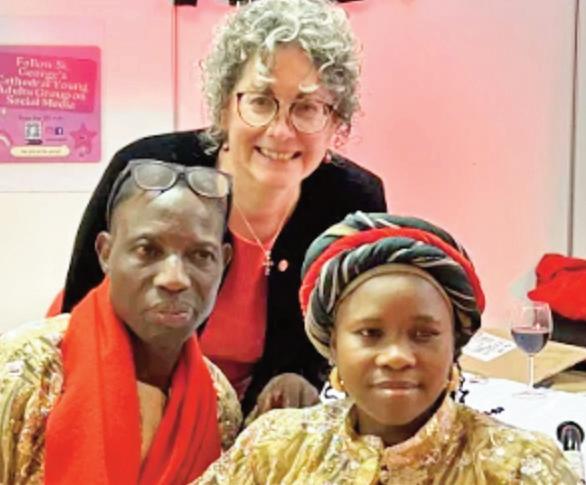
November in London, as part of the charity's #RedWednesday programme at St George's Cathedral, Southwark.
She said: "The award means so much to me, my husband and the rest of my family. I really cherish it. When I came back, I presented [the award] to the other parishioners at the church, and they were in awe."
ACN has provided some financial support to the survivors of the attack, including Mrs Attah, and approved funding for a memorial site honouring the victims.
Mrs Attah said that the help she received has brought her closer to obtaining prosthetic legs which will enable her to walk again.
She concluded: "I want to thank ACN's benefactors. I pray that God will continue to bless all of you."
Susan Francois, CSJP
"We believe that our collective and personal prayer holds transformative power not only for ourselves, but for our world, during this critical time."
The Sisters of St Joseph of Peace in the United Kingdom and United States are uniting in a special six-month prayer and reflection process for elections taking place in both their countries and across the globe. The daily election prayer, weekly intention, and reflection resources are available for download on a special page on the Congregation's website: www.csjp.org/electionprayer
The sisters invite others to join them in this effort.
"We believe that our collective and personal prayer holds transformative power not only for ourselves, but for our world, during this critical time," said Congregation Leader
Sister Andrea Nenzel. "Today we are asking that all of us commit to join together in a transformative endeavor of intentional daily prayer until the end of this year. There is no set time, just an invitation to join daily in prayer during this time of worldwide elections."
Pope Francis has said that "elections are an essential moment in the life of any country, since they allow all citizens responsibly to choose their leaders." More than two billion people across more than sixty countries have already or are preparing to vote in 2024, the largest global election year in human history. Voters in the United Kingdom will go to the polls on 4 July and in the United States on 5 November. National elections are also scheduled later this year in Algeria, France,

Georgia, Ghana, Jordan, Lithuania, Mauritius, Moldova, Mozambique, Namibia, Palau, Romania, Rwanda, Somaliland, South Sudan, Syria, and Venezuela.
The Sisters have chosen to commit to pray for global elections, during a time of increased polarization, misinformation, armed conflict, and climate crisis, as a way of living out their 2022 Congregation Chapter Act, To Be Who We Say We Are: "These new times demand a change of heart: to be, think, and act differently. Our spiritual lives require deep reexamination and transformation; our outward
actions must confront privilege and power in ourselves and society … It is time to live our words. We embrace these promptings of the Sprit with courage, humility, hope and trust."
In addition to sharing the text of the daily prayer and weekly intention, the Congregation website also includes resources from a variety of organisations, including Pax Christi, CAFOD, the Columbans, and Churches Together, and the Leadership Conference of Women Religious to help voters reflect and prepare for the July UK Election and November US election.
'There is room for everyone in the Church, for everyone! No one is useless; no one is superfluous; there is room for everyone. Just as we are, everyone.'
The Director of the Holy See Press Office, Matteo Bruni, has issued a brief statement, in response to reports that the Pope had used a derogatory term in a remark about the admission of homosexual people to the seminary.
"Pope Francis is aware of the recent articles regarding a closed-door conversation with the bishops of the CEI [Italian Bishops' Conference].
As he has stated on many occasions, 'There is room for everyone in the Church, for everyone! No one is useless; no one is superfluous; there is room for everyone. Just as we are, everyone.' The Pope never intended to offend or express himself in homophobic terms, and he apologizes to those who felt offended by the use of a term, as reported by others."
In a statement today LGBT+ Catholics Westminster say: "Pope Francis' alleged use of the slang word, 'frociaggine' would be considered offensive, not only by LGBT+ Catholics but also and not least, by those who offer ordained ministry among the people of God. LGBT+ Catholics Westminster question why his off-the-cuff remark was not challenged within the Italian Bishops Conference meeting, rather than being leaked to controversial media sources?
"Is this another example in which sexuality and gender identity are being used to weaponise against the Pope's consistent welcoming of LGBT+ Catholics, parents and families?
"We prefer to judge Pope Francis by the many positive things that he has said and done for LGBT+ Catholics, parents and families, rather
C R O S S W O R D

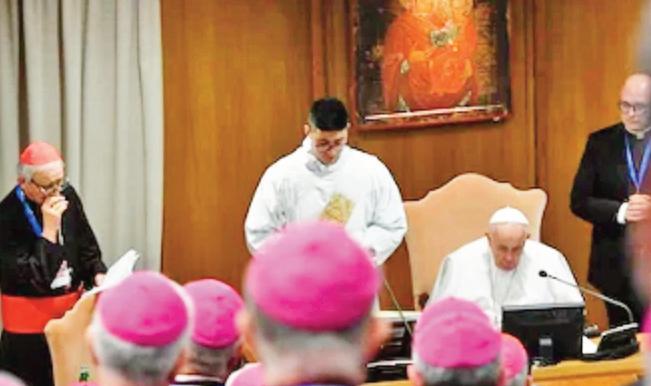
than collude with those who seek to undermine him.
"We welcome the policy of the Catholic Bishops Conference of England & Wales, and many religious orders over a number of years, that, all other things being equal, a diverse sexual orientation is not, of itself, a bar to seminary admission or ordination.



You can use both sets of clues to solve the puzzle: the solutions are the same.
CRYPTIC Across
1 Samuel's crafty man, cursed sailor almost catches fish (7)
5 When in Paris I discover Ecclesiasticus' Ben Sira (5)
8 Paul's detailed letter describing the Empire (5)
9 'Papae Sixti nisi est' is translated in chapel (7)
10 Move against female martyr (7)
11 One of two helping David find themselves amongst rabbit tails (5)
13 American girl's written first 18 for the 8 Church (6)
15 Abram's Amorite ally, Chloe's opposite (6)
18 Microphone, small American contribution to St Cecilia's art (5)
20 Abram's servant high priest announced 'easy', being first to Rebekah (7)
22 Girl, old golfing type, attends Baptist chapels (7)
23 Savings account he's almost sacrificed (5)
24 Chaplain of Artillery's name is forgotten (5)
25 Morning, is he wrong in thinking there are no Gods? (7)
CRYPTIC Down
1 Parry's hymn from John's first letter includes line in dubious measure (9)
2 Some Old Testament volumes (7)
3 Had Ulster divided, all over Jacob's daughter (5)
4 Vehicle to get to old Number One: was it Ave Maria for him? (6)
5 Society of 5 business types follow the first person in speaking French (7)
6 Being second in the East End isn't one of the blessed dead (5)
7 View bishop's domain (3)
12 Sick with icy rum, plying, 8s said, this part Aegean coast (9)
14 One relative, the first maybe to describe lepers in the Bible (7)
16 Old footballer swapping cap? It's over for one writing 18 for the 8 Church (7)
17 Biblical country, to scupper Siamese, partly invaded (6)
19 Angel is originally sadistic, and threatening and nasty (5)
21 One quiet small US state imbibed whiskey (5)
22 Tooting, when passing over an abbey in France? (3) QUICK Across
1 Friend of Amnon, 'a very shrewd man' (7)
5 Another name for Elymas: Bar ----- (5)
8 Empire which ruled Palestine and Asia Minor in NT times (5)
9 Chapel of the Vatican whose ceiling was famously painted by Michelangelo (7)
10 First Christian martyr (7)
11 Leader of the Gittites (5)
13 Orlande de ------, with Palestrina and Victoria, the three giants of late medieval Church 18 (6)
15 Vale where the Israelites cut a cluster of grapes as proof of the Promised Land's bounty (6)
18 Integral aspect of many church services (5)
20 Son of Moses and Zipporah (7)
22 Name applied for a group of 19th century nonconformist chapels (7)
23 The second patriarch; son of Abraham and Sarah (5)
24 Priest who is a member of a cathedral chapter (5)
25 Lack of belief in the existence of God or gods (7)
QUICK Down
1 Holy city for Jews and Christians and Muslims (9)
2 Fourth book of the Pentateuch (7)
3 Daughter of Leah and Jacob (5) 4 Ferruccio ------, one of many to have composed a version of Ave Maria (1877) (6)
"As we celebrate the 25th Anniversary of LGBT+ Catholics Westminster we give thanks for the affirmation offered by Bishop Paul McAleenan, presiding at the 25th Anniversary Mass, Farm Street Jesuit Church, on 26 May 2024, and his words during the after-Mass Reception. All are welcome in a Synodal Church, committed to the radical inclusion of all God's people."
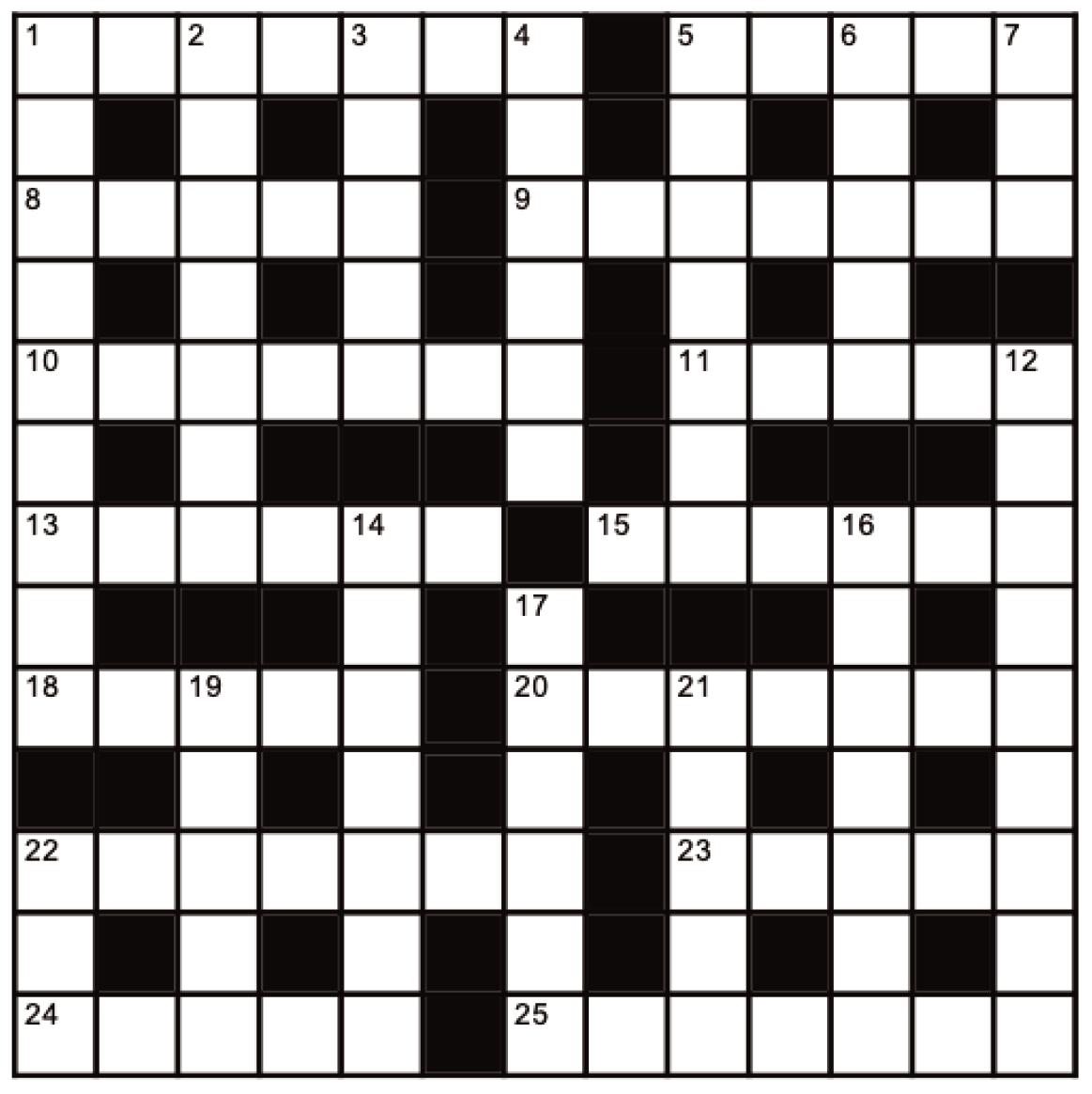
5 Followers of Ignatius of Loyola (7)
6 Holy person deemed worthy of canonization (5)
7 Bishopric (3) 12 8 province from 27 AD, covering much of the eastern Adriatic and Balkan interior (9)
14 Having a physical or moral blemish so as to make impure (7)
16 Maurizio -------, important early 17th century composer and maestro di cappella at Bologna (7)
17 OT empire created by Cyrus the Great and destroyed by Alexander the Great (6)
19 Adversary of God; tempter of mankind; master of Hell (5)
21 Scots Gaelic (5)
22 Influential Benedictine abbey of Normandy at the time of the Conqueror (3) SOLUTION Across: 1 Jonadab, 5 Jesus, 8 Roman,